[SOLVED] Comprehensive Care Plan for Ms. Wong and Mrs. James
VerifiedAdded on 2021/04/16
|23
|4988
|98
AI Summary
This assignment involves creating a comprehensive care plan for two elderly patients, Ms. Wong and Mrs. James. For Ms. Wong, the care plan includes addressing her chronic health problems such as Type 2 Diabetes, Hypertension, and Osteoporosis. The RN is informed of these conditions to ensure proper care. In contrast, Mrs. James has a history of Alzheimer's disease and UTI, for whom Frusemide has been prescribed. Effective communication with the RN and patient/family caregiver is emphasized, using skills such as respect, patience, active listening, and empathy.
Contribute Materials
Your contribution can guide someone’s learning journey. Share your
documents today.
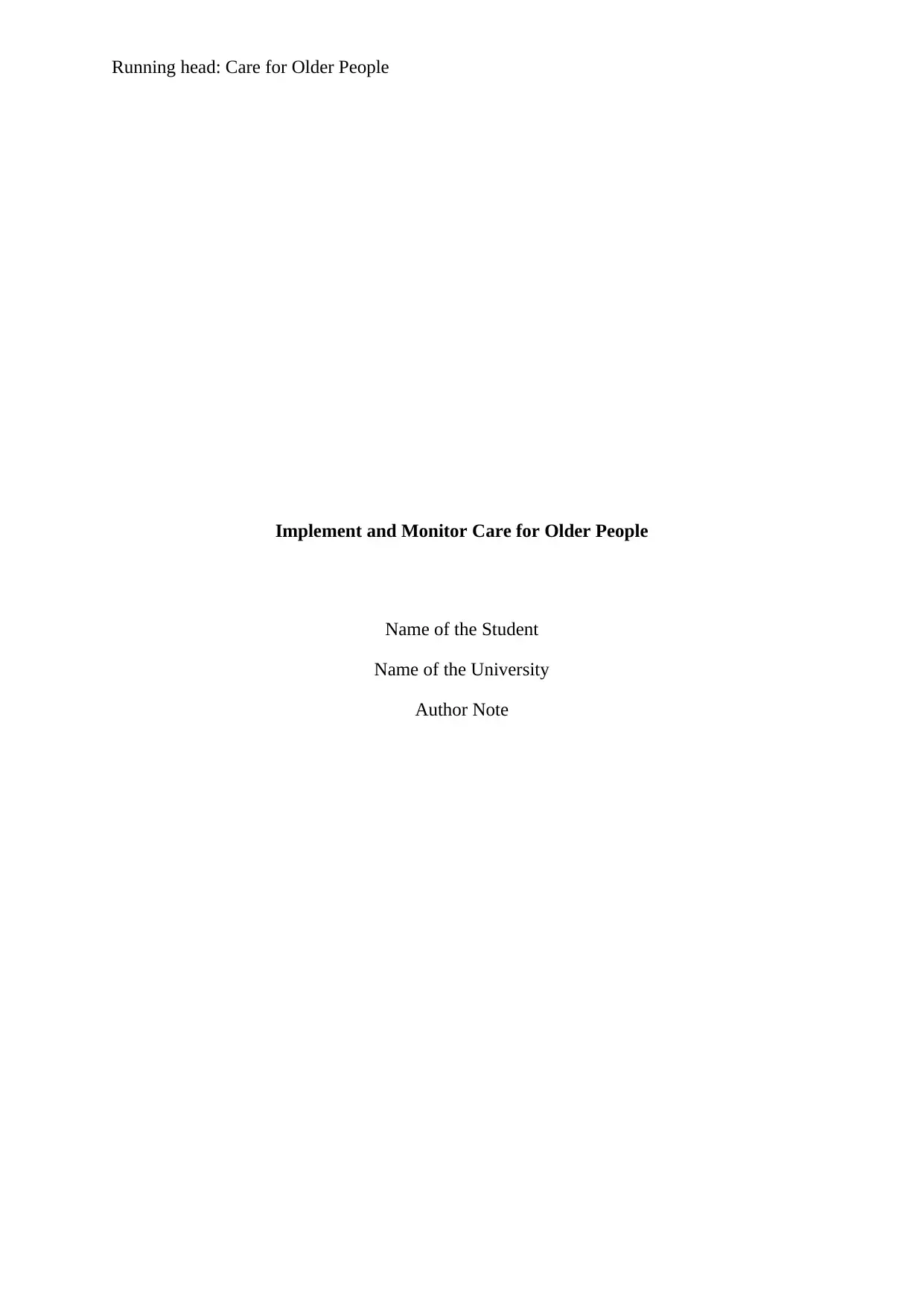
Running head: Care for Older People
Implement and Monitor Care for Older People
Name of the Student
Name of the University
Author Note
Implement and Monitor Care for Older People
Name of the Student
Name of the University
Author Note
Secure Best Marks with AI Grader
Need help grading? Try our AI Grader for instant feedback on your assignments.
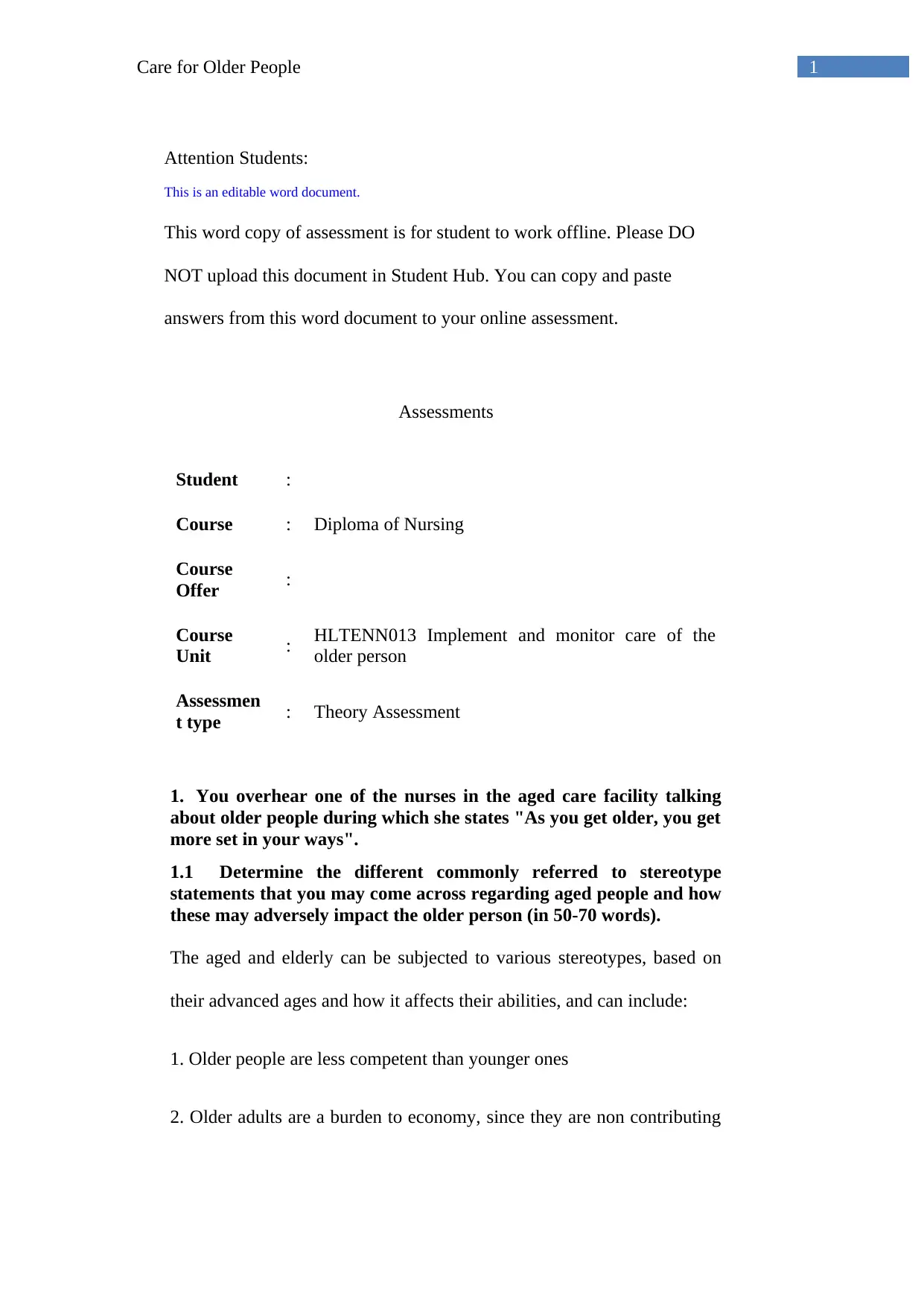
1Care for Older People
Attention Students:
This is an editable word document.
This word copy of assessment is for student to work offline. Please DO
NOT upload this document in Student Hub. You can copy and paste
answers from this word document to your online assessment.
Assessments
Student :
Course : Diploma of Nursing
Course
Offer :
Course
Unit : HLTENN013 Implement and monitor care of the
older person
Assessmen
t type : Theory Assessment
1. You overhear one of the nurses in the aged care facility talking
about older people during which she states "As you get older, you get
more set in your ways".
1.1 Determine the different commonly referred to stereotype
statements that you may come across regarding aged people and how
these may adversely impact the older person (in 50-70 words).
The aged and elderly can be subjected to various stereotypes, based on
their advanced ages and how it affects their abilities, and can include:
1. Older people are less competent than younger ones
2. Older adults are a burden to economy, since they are non contributing
Attention Students:
This is an editable word document.
This word copy of assessment is for student to work offline. Please DO
NOT upload this document in Student Hub. You can copy and paste
answers from this word document to your online assessment.
Assessments
Student :
Course : Diploma of Nursing
Course
Offer :
Course
Unit : HLTENN013 Implement and monitor care of the
older person
Assessmen
t type : Theory Assessment
1. You overhear one of the nurses in the aged care facility talking
about older people during which she states "As you get older, you get
more set in your ways".
1.1 Determine the different commonly referred to stereotype
statements that you may come across regarding aged people and how
these may adversely impact the older person (in 50-70 words).
The aged and elderly can be subjected to various stereotypes, based on
their advanced ages and how it affects their abilities, and can include:
1. Older people are less competent than younger ones
2. Older adults are a burden to economy, since they are non contributing
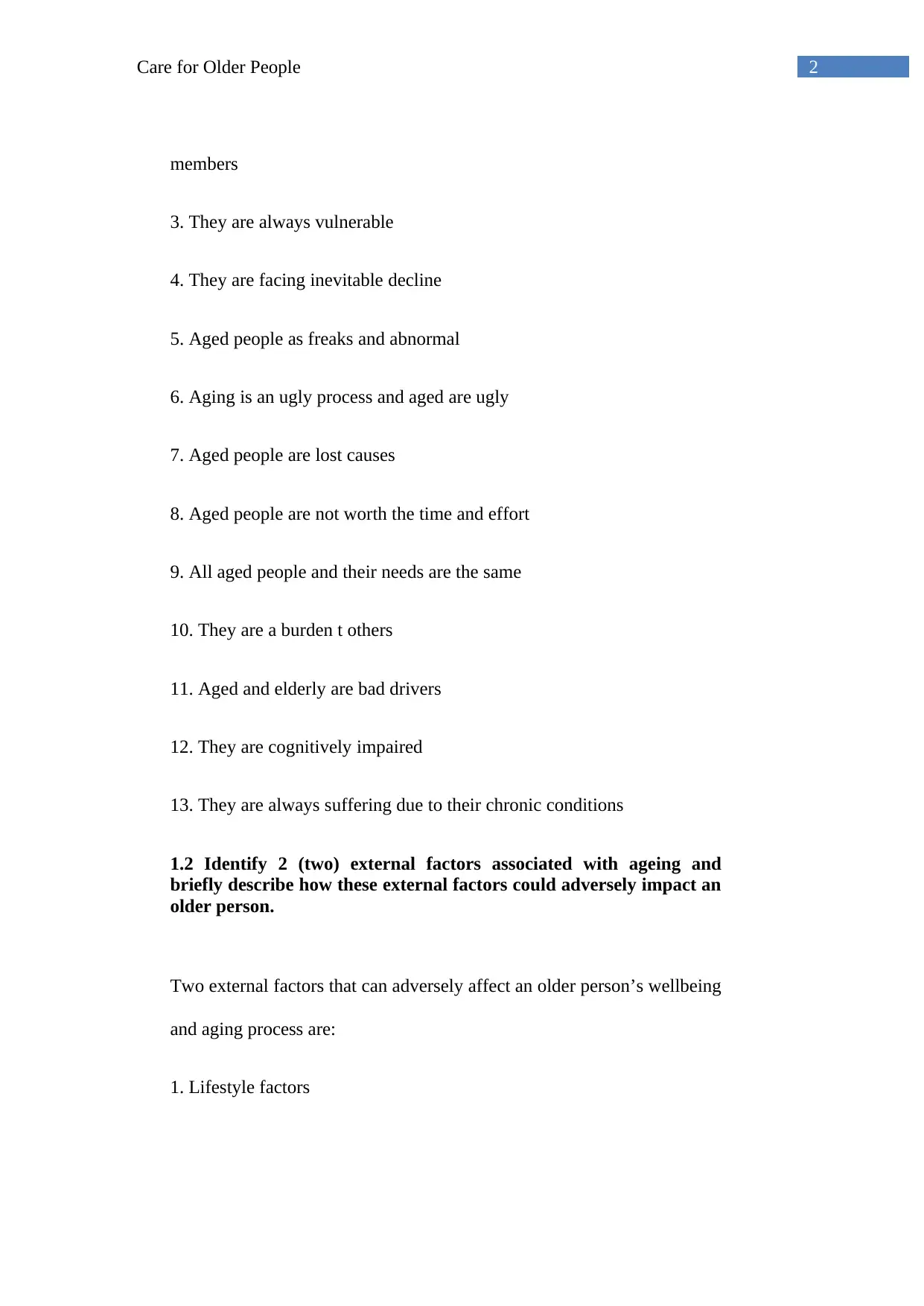
2Care for Older People
members
3. They are always vulnerable
4. They are facing inevitable decline
5. Aged people as freaks and abnormal
6. Aging is an ugly process and aged are ugly
7. Aged people are lost causes
8. Aged people are not worth the time and effort
9. All aged people and their needs are the same
10. They are a burden t others
11. Aged and elderly are bad drivers
12. They are cognitively impaired
13. They are always suffering due to their chronic conditions
1.2 Identify 2 (two) external factors associated with ageing and
briefly describe how these external factors could adversely impact an
older person.
Two external factors that can adversely affect an older person’s wellbeing
and aging process are:
1. Lifestyle factors
members
3. They are always vulnerable
4. They are facing inevitable decline
5. Aged people as freaks and abnormal
6. Aging is an ugly process and aged are ugly
7. Aged people are lost causes
8. Aged people are not worth the time and effort
9. All aged people and their needs are the same
10. They are a burden t others
11. Aged and elderly are bad drivers
12. They are cognitively impaired
13. They are always suffering due to their chronic conditions
1.2 Identify 2 (two) external factors associated with ageing and
briefly describe how these external factors could adversely impact an
older person.
Two external factors that can adversely affect an older person’s wellbeing
and aging process are:
1. Lifestyle factors
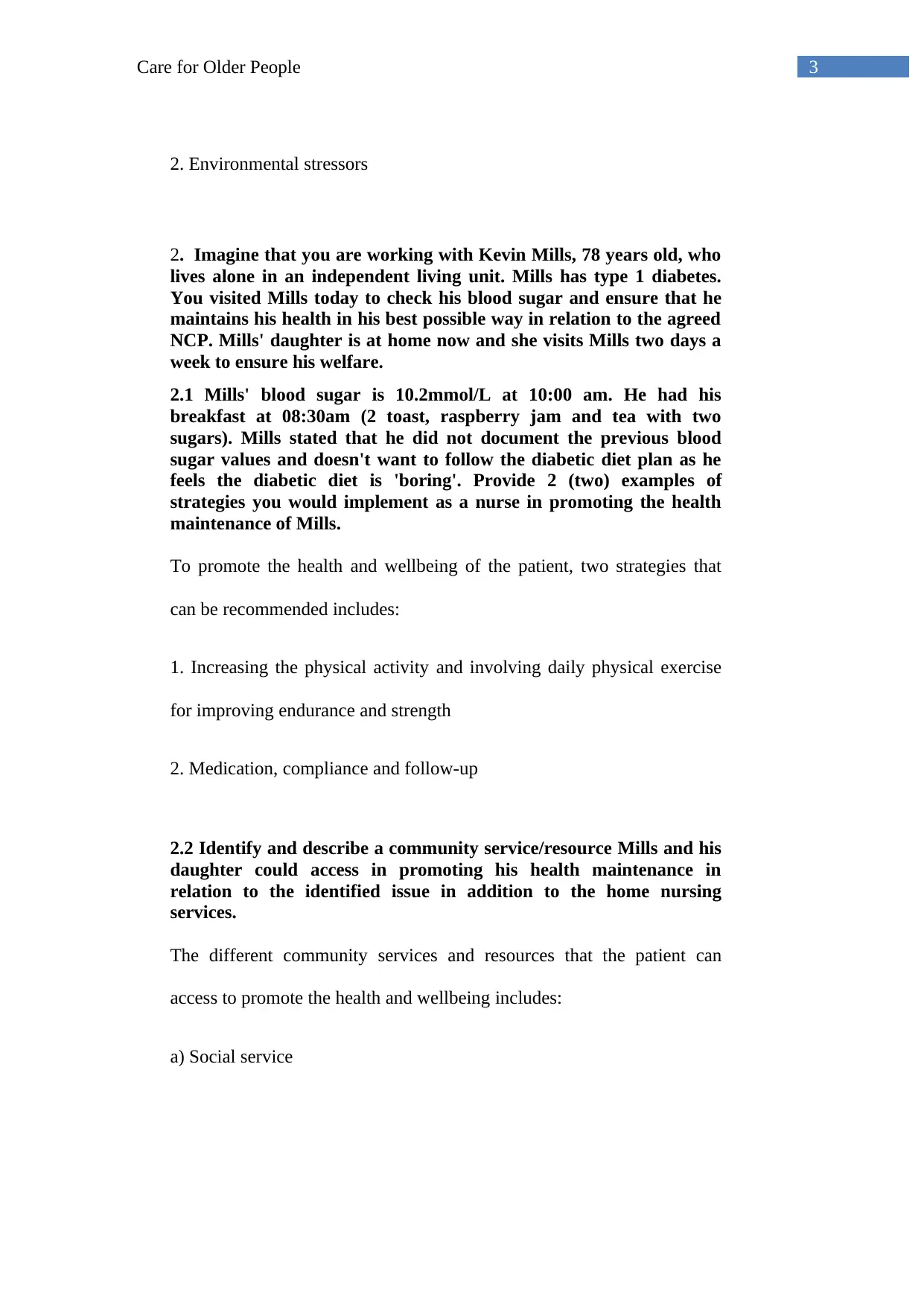
3Care for Older People
2. Environmental stressors
2. Imagine that you are working with Kevin Mills, 78 years old, who
lives alone in an independent living unit. Mills has type 1 diabetes.
You visited Mills today to check his blood sugar and ensure that he
maintains his health in his best possible way in relation to the agreed
NCP. Mills' daughter is at home now and she visits Mills two days a
week to ensure his welfare.
2.1 Mills' blood sugar is 10.2mmol/L at 10:00 am. He had his
breakfast at 08:30am (2 toast, raspberry jam and tea with two
sugars). Mills stated that he did not document the previous blood
sugar values and doesn't want to follow the diabetic diet plan as he
feels the diabetic diet is 'boring'. Provide 2 (two) examples of
strategies you would implement as a nurse in promoting the health
maintenance of Mills.
To promote the health and wellbeing of the patient, two strategies that
can be recommended includes:
1. Increasing the physical activity and involving daily physical exercise
for improving endurance and strength
2. Medication, compliance and follow-up
2.2 Identify and describe a community service/resource Mills and his
daughter could access in promoting his health maintenance in
relation to the identified issue in addition to the home nursing
services.
The different community services and resources that the patient can
access to promote the health and wellbeing includes:
a) Social service
2. Environmental stressors
2. Imagine that you are working with Kevin Mills, 78 years old, who
lives alone in an independent living unit. Mills has type 1 diabetes.
You visited Mills today to check his blood sugar and ensure that he
maintains his health in his best possible way in relation to the agreed
NCP. Mills' daughter is at home now and she visits Mills two days a
week to ensure his welfare.
2.1 Mills' blood sugar is 10.2mmol/L at 10:00 am. He had his
breakfast at 08:30am (2 toast, raspberry jam and tea with two
sugars). Mills stated that he did not document the previous blood
sugar values and doesn't want to follow the diabetic diet plan as he
feels the diabetic diet is 'boring'. Provide 2 (two) examples of
strategies you would implement as a nurse in promoting the health
maintenance of Mills.
To promote the health and wellbeing of the patient, two strategies that
can be recommended includes:
1. Increasing the physical activity and involving daily physical exercise
for improving endurance and strength
2. Medication, compliance and follow-up
2.2 Identify and describe a community service/resource Mills and his
daughter could access in promoting his health maintenance in
relation to the identified issue in addition to the home nursing
services.
The different community services and resources that the patient can
access to promote the health and wellbeing includes:
a) Social service
Secure Best Marks with AI Grader
Need help grading? Try our AI Grader for instant feedback on your assignments.
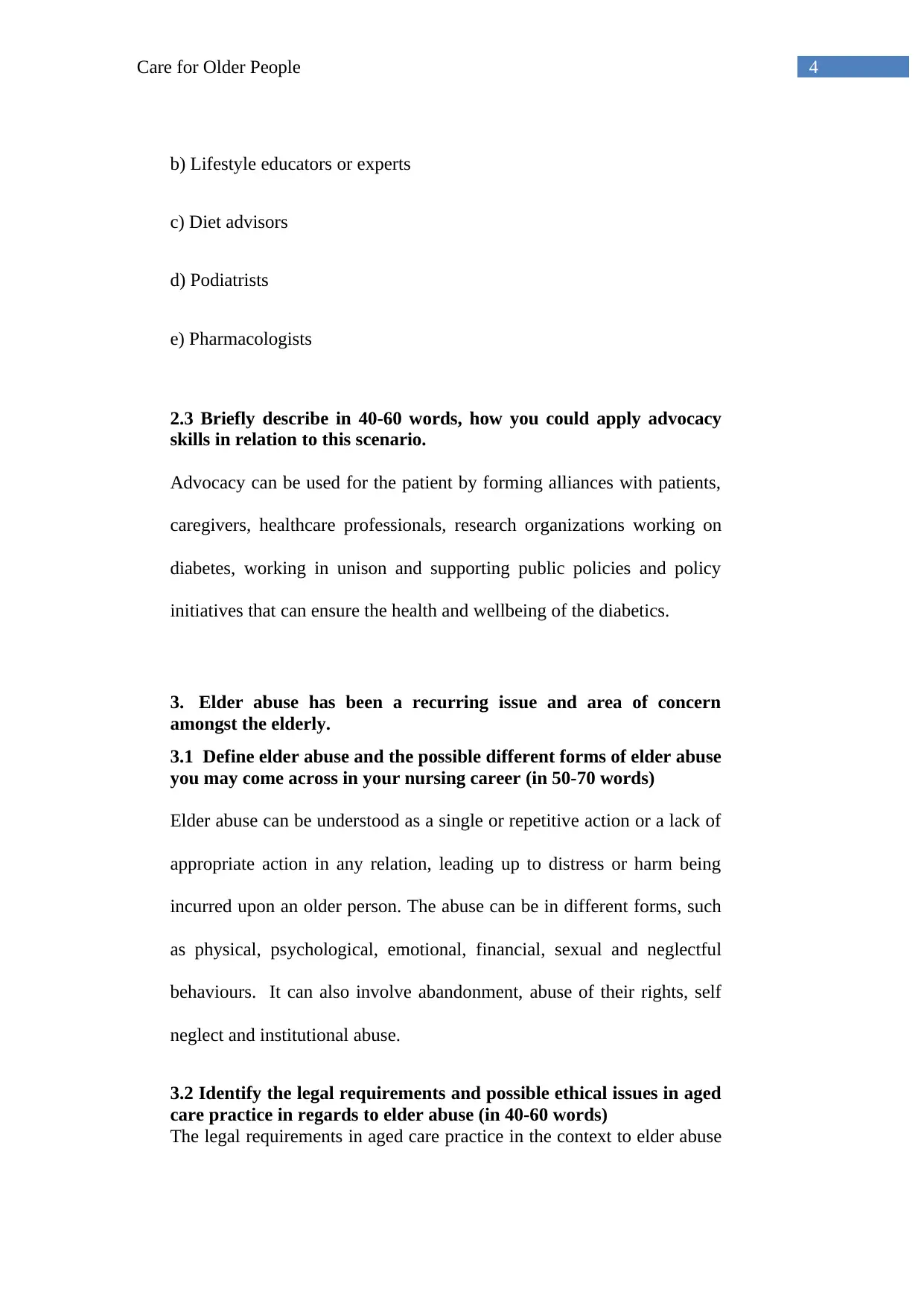
4Care for Older People
b) Lifestyle educators or experts
c) Diet advisors
d) Podiatrists
e) Pharmacologists
2.3 Briefly describe in 40-60 words, how you could apply advocacy
skills in relation to this scenario.
Advocacy can be used for the patient by forming alliances with patients,
caregivers, healthcare professionals, research organizations working on
diabetes, working in unison and supporting public policies and policy
initiatives that can ensure the health and wellbeing of the diabetics.
3. Elder abuse has been a recurring issue and area of concern
amongst the elderly.
3.1 Define elder abuse and the possible different forms of elder abuse
you may come across in your nursing career (in 50-70 words)
Elder abuse can be understood as a single or repetitive action or a lack of
appropriate action in any relation, leading up to distress or harm being
incurred upon an older person. The abuse can be in different forms, such
as physical, psychological, emotional, financial, sexual and neglectful
behaviours. It can also involve abandonment, abuse of their rights, self
neglect and institutional abuse.
3.2 Identify the legal requirements and possible ethical issues in aged
care practice in regards to elder abuse (in 40-60 words)
The legal requirements in aged care practice in the context to elder abuse
b) Lifestyle educators or experts
c) Diet advisors
d) Podiatrists
e) Pharmacologists
2.3 Briefly describe in 40-60 words, how you could apply advocacy
skills in relation to this scenario.
Advocacy can be used for the patient by forming alliances with patients,
caregivers, healthcare professionals, research organizations working on
diabetes, working in unison and supporting public policies and policy
initiatives that can ensure the health and wellbeing of the diabetics.
3. Elder abuse has been a recurring issue and area of concern
amongst the elderly.
3.1 Define elder abuse and the possible different forms of elder abuse
you may come across in your nursing career (in 50-70 words)
Elder abuse can be understood as a single or repetitive action or a lack of
appropriate action in any relation, leading up to distress or harm being
incurred upon an older person. The abuse can be in different forms, such
as physical, psychological, emotional, financial, sexual and neglectful
behaviours. It can also involve abandonment, abuse of their rights, self
neglect and institutional abuse.
3.2 Identify the legal requirements and possible ethical issues in aged
care practice in regards to elder abuse (in 40-60 words)
The legal requirements in aged care practice in the context to elder abuse
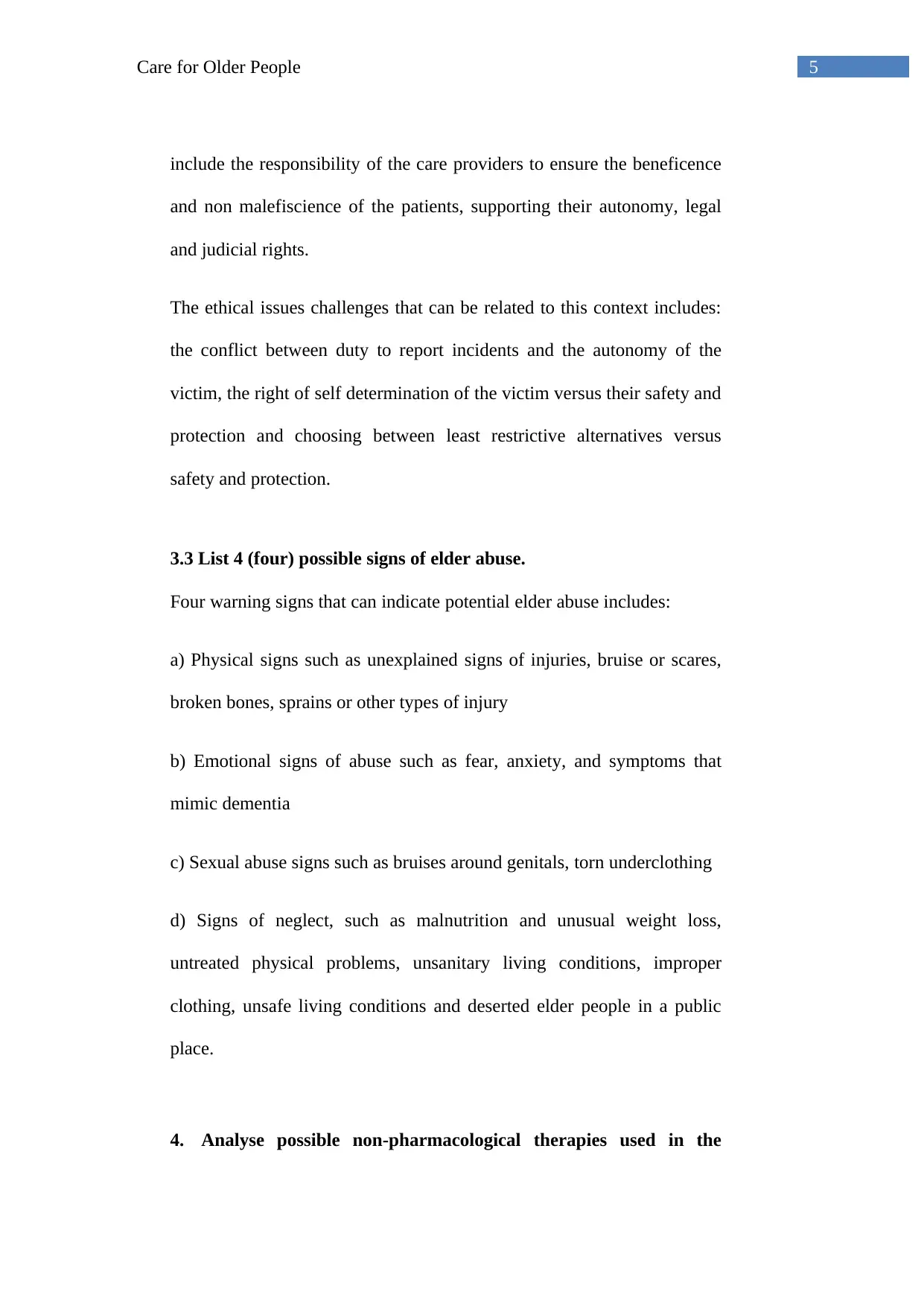
5Care for Older People
include the responsibility of the care providers to ensure the beneficence
and non malefiscience of the patients, supporting their autonomy, legal
and judicial rights.
The ethical issues challenges that can be related to this context includes:
the conflict between duty to report incidents and the autonomy of the
victim, the right of self determination of the victim versus their safety and
protection and choosing between least restrictive alternatives versus
safety and protection.
3.3 List 4 (four) possible signs of elder abuse.
Four warning signs that can indicate potential elder abuse includes:
a) Physical signs such as unexplained signs of injuries, bruise or scares,
broken bones, sprains or other types of injury
b) Emotional signs of abuse such as fear, anxiety, and symptoms that
mimic dementia
c) Sexual abuse signs such as bruises around genitals, torn underclothing
d) Signs of neglect, such as malnutrition and unusual weight loss,
untreated physical problems, unsanitary living conditions, improper
clothing, unsafe living conditions and deserted elder people in a public
place.
4. Analyse possible non-pharmacological therapies used in the
include the responsibility of the care providers to ensure the beneficence
and non malefiscience of the patients, supporting their autonomy, legal
and judicial rights.
The ethical issues challenges that can be related to this context includes:
the conflict between duty to report incidents and the autonomy of the
victim, the right of self determination of the victim versus their safety and
protection and choosing between least restrictive alternatives versus
safety and protection.
3.3 List 4 (four) possible signs of elder abuse.
Four warning signs that can indicate potential elder abuse includes:
a) Physical signs such as unexplained signs of injuries, bruise or scares,
broken bones, sprains or other types of injury
b) Emotional signs of abuse such as fear, anxiety, and symptoms that
mimic dementia
c) Sexual abuse signs such as bruises around genitals, torn underclothing
d) Signs of neglect, such as malnutrition and unusual weight loss,
untreated physical problems, unsanitary living conditions, improper
clothing, unsafe living conditions and deserted elder people in a public
place.
4. Analyse possible non-pharmacological therapies used in the
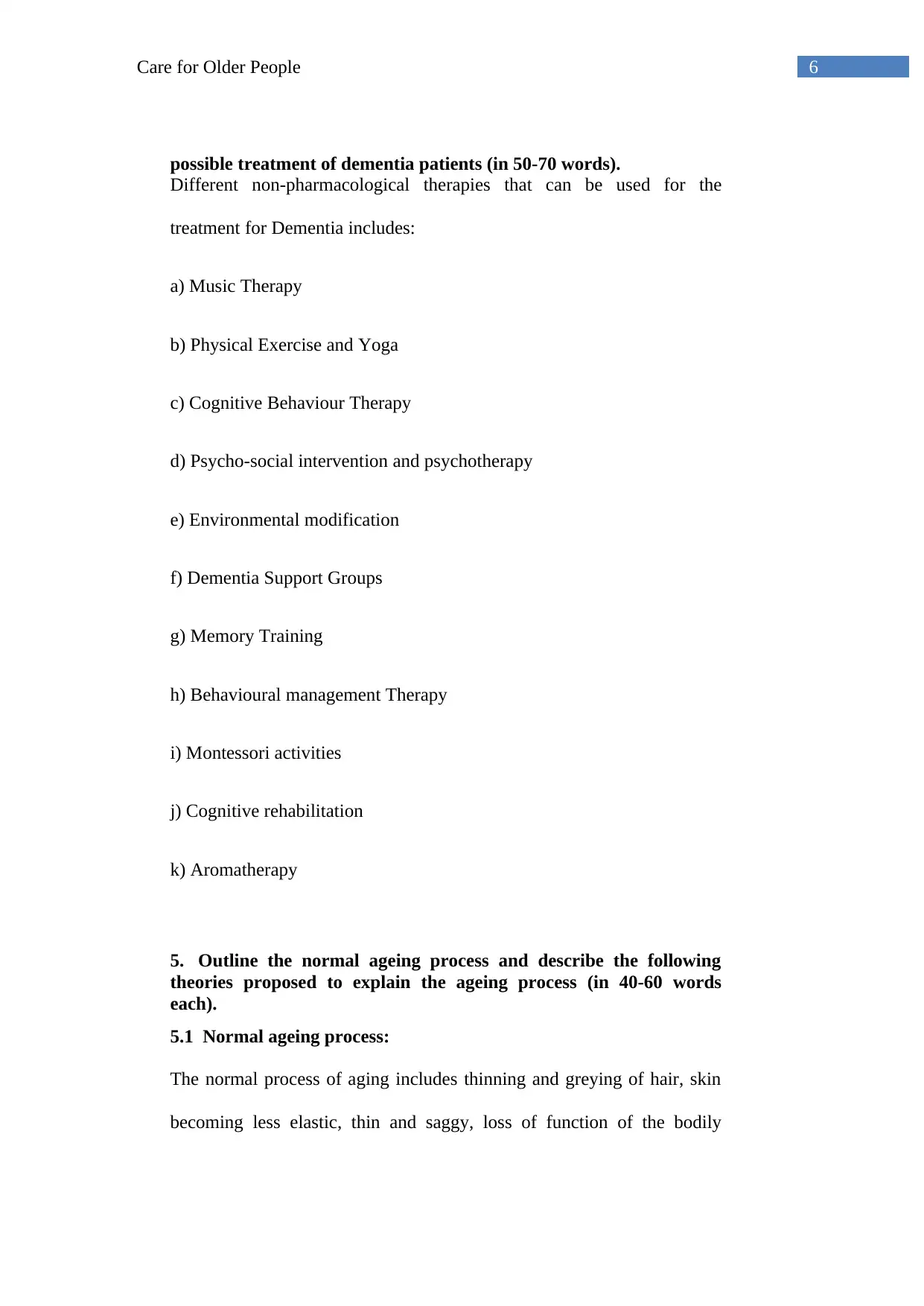
6Care for Older People
possible treatment of dementia patients (in 50-70 words).
Different non-pharmacological therapies that can be used for the
treatment for Dementia includes:
a) Music Therapy
b) Physical Exercise and Yoga
c) Cognitive Behaviour Therapy
d) Psycho-social intervention and psychotherapy
e) Environmental modification
f) Dementia Support Groups
g) Memory Training
h) Behavioural management Therapy
i) Montessori activities
j) Cognitive rehabilitation
k) Aromatherapy
5. Outline the normal ageing process and describe the following
theories proposed to explain the ageing process (in 40-60 words
each).
5.1 Normal ageing process:
The normal process of aging includes thinning and greying of hair, skin
becoming less elastic, thin and saggy, loss of function of the bodily
possible treatment of dementia patients (in 50-70 words).
Different non-pharmacological therapies that can be used for the
treatment for Dementia includes:
a) Music Therapy
b) Physical Exercise and Yoga
c) Cognitive Behaviour Therapy
d) Psycho-social intervention and psychotherapy
e) Environmental modification
f) Dementia Support Groups
g) Memory Training
h) Behavioural management Therapy
i) Montessori activities
j) Cognitive rehabilitation
k) Aromatherapy
5. Outline the normal ageing process and describe the following
theories proposed to explain the ageing process (in 40-60 words
each).
5.1 Normal ageing process:
The normal process of aging includes thinning and greying of hair, skin
becoming less elastic, thin and saggy, loss of function of the bodily
Paraphrase This Document
Need a fresh take? Get an instant paraphrase of this document with our AI Paraphraser
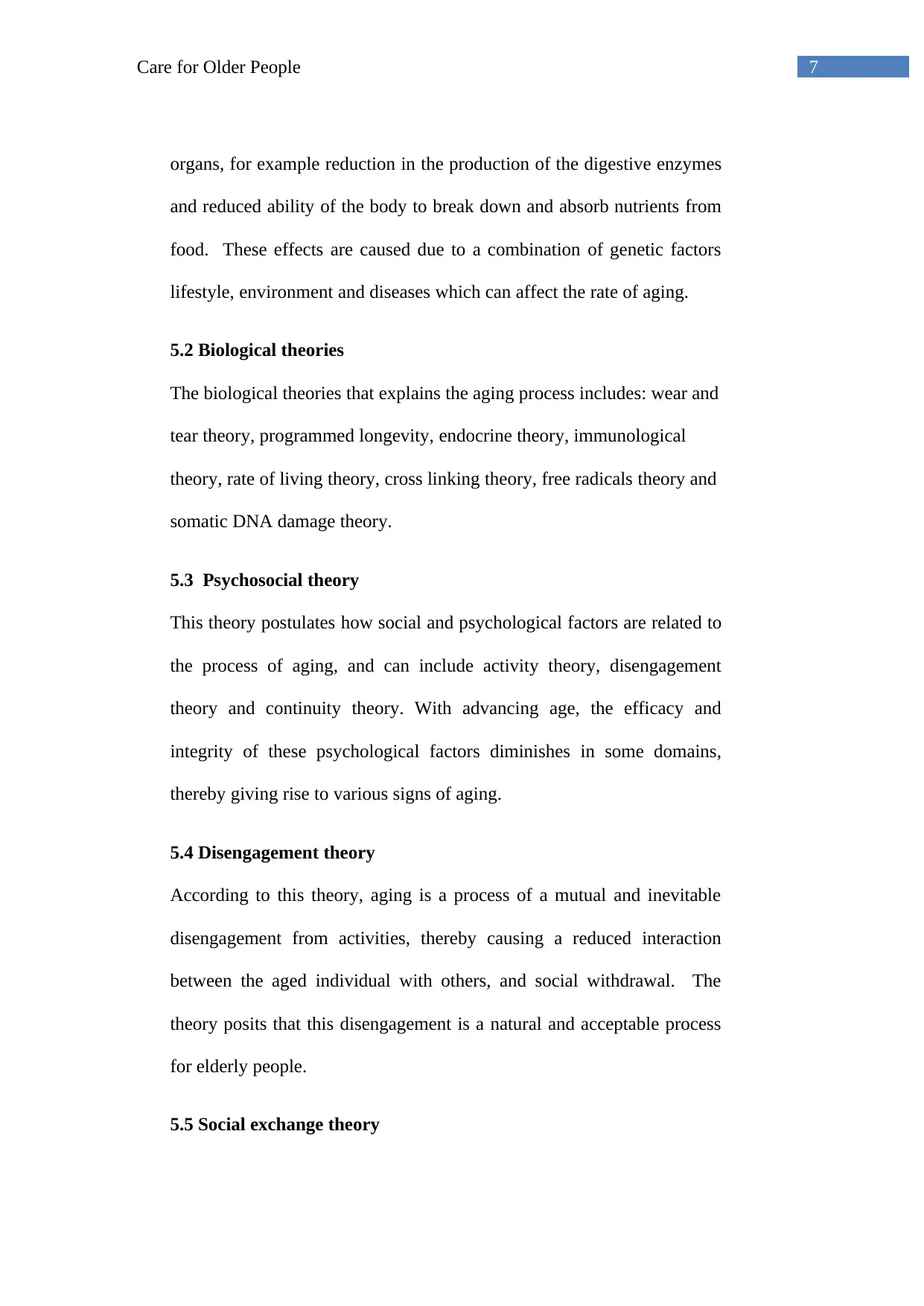
7Care for Older People
organs, for example reduction in the production of the digestive enzymes
and reduced ability of the body to break down and absorb nutrients from
food. These effects are caused due to a combination of genetic factors
lifestyle, environment and diseases which can affect the rate of aging.
5.2 Biological theories
The biological theories that explains the aging process includes: wear and
tear theory, programmed longevity, endocrine theory, immunological
theory, rate of living theory, cross linking theory, free radicals theory and
somatic DNA damage theory.
5.3 Psychosocial theory
This theory postulates how social and psychological factors are related to
the process of aging, and can include activity theory, disengagement
theory and continuity theory. With advancing age, the efficacy and
integrity of these psychological factors diminishes in some domains,
thereby giving rise to various signs of aging.
5.4 Disengagement theory
According to this theory, aging is a process of a mutual and inevitable
disengagement from activities, thereby causing a reduced interaction
between the aged individual with others, and social withdrawal. The
theory posits that this disengagement is a natural and acceptable process
for elderly people.
5.5 Social exchange theory
organs, for example reduction in the production of the digestive enzymes
and reduced ability of the body to break down and absorb nutrients from
food. These effects are caused due to a combination of genetic factors
lifestyle, environment and diseases which can affect the rate of aging.
5.2 Biological theories
The biological theories that explains the aging process includes: wear and
tear theory, programmed longevity, endocrine theory, immunological
theory, rate of living theory, cross linking theory, free radicals theory and
somatic DNA damage theory.
5.3 Psychosocial theory
This theory postulates how social and psychological factors are related to
the process of aging, and can include activity theory, disengagement
theory and continuity theory. With advancing age, the efficacy and
integrity of these psychological factors diminishes in some domains,
thereby giving rise to various signs of aging.
5.4 Disengagement theory
According to this theory, aging is a process of a mutual and inevitable
disengagement from activities, thereby causing a reduced interaction
between the aged individual with others, and social withdrawal. The
theory posits that this disengagement is a natural and acceptable process
for elderly people.
5.5 Social exchange theory
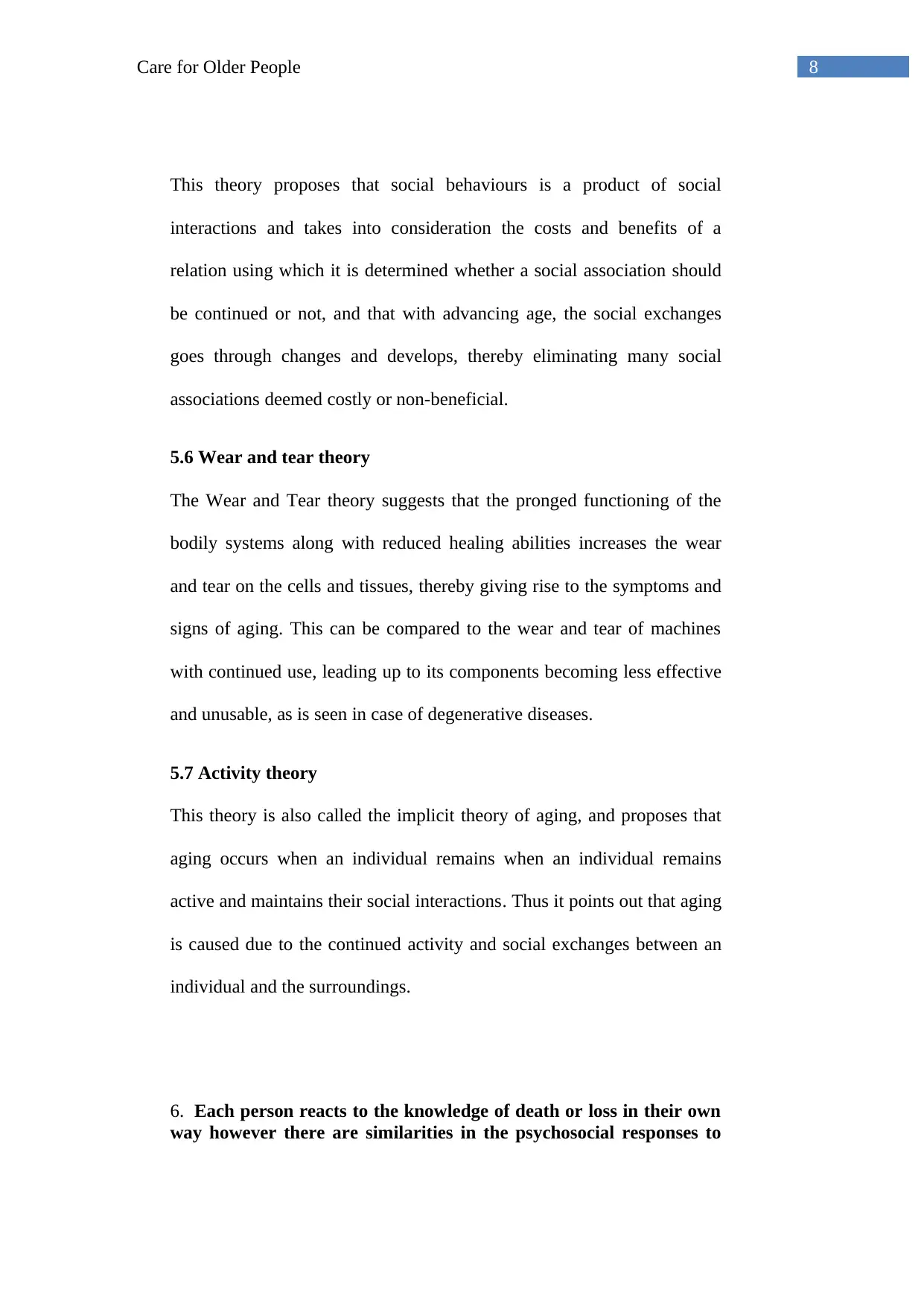
8Care for Older People
This theory proposes that social behaviours is a product of social
interactions and takes into consideration the costs and benefits of a
relation using which it is determined whether a social association should
be continued or not, and that with advancing age, the social exchanges
goes through changes and develops, thereby eliminating many social
associations deemed costly or non-beneficial.
5.6 Wear and tear theory
The Wear and Tear theory suggests that the pronged functioning of the
bodily systems along with reduced healing abilities increases the wear
and tear on the cells and tissues, thereby giving rise to the symptoms and
signs of aging. This can be compared to the wear and tear of machines
with continued use, leading up to its components becoming less effective
and unusable, as is seen in case of degenerative diseases.
5.7 Activity theory
This theory is also called the implicit theory of aging, and proposes that
aging occurs when an individual remains when an individual remains
active and maintains their social interactions. Thus it points out that aging
is caused due to the continued activity and social exchanges between an
individual and the surroundings.
6. Each person reacts to the knowledge of death or loss in their own
way however there are similarities in the psychosocial responses to
This theory proposes that social behaviours is a product of social
interactions and takes into consideration the costs and benefits of a
relation using which it is determined whether a social association should
be continued or not, and that with advancing age, the social exchanges
goes through changes and develops, thereby eliminating many social
associations deemed costly or non-beneficial.
5.6 Wear and tear theory
The Wear and Tear theory suggests that the pronged functioning of the
bodily systems along with reduced healing abilities increases the wear
and tear on the cells and tissues, thereby giving rise to the symptoms and
signs of aging. This can be compared to the wear and tear of machines
with continued use, leading up to its components becoming less effective
and unusable, as is seen in case of degenerative diseases.
5.7 Activity theory
This theory is also called the implicit theory of aging, and proposes that
aging occurs when an individual remains when an individual remains
active and maintains their social interactions. Thus it points out that aging
is caused due to the continued activity and social exchanges between an
individual and the surroundings.
6. Each person reacts to the knowledge of death or loss in their own
way however there are similarities in the psychosocial responses to
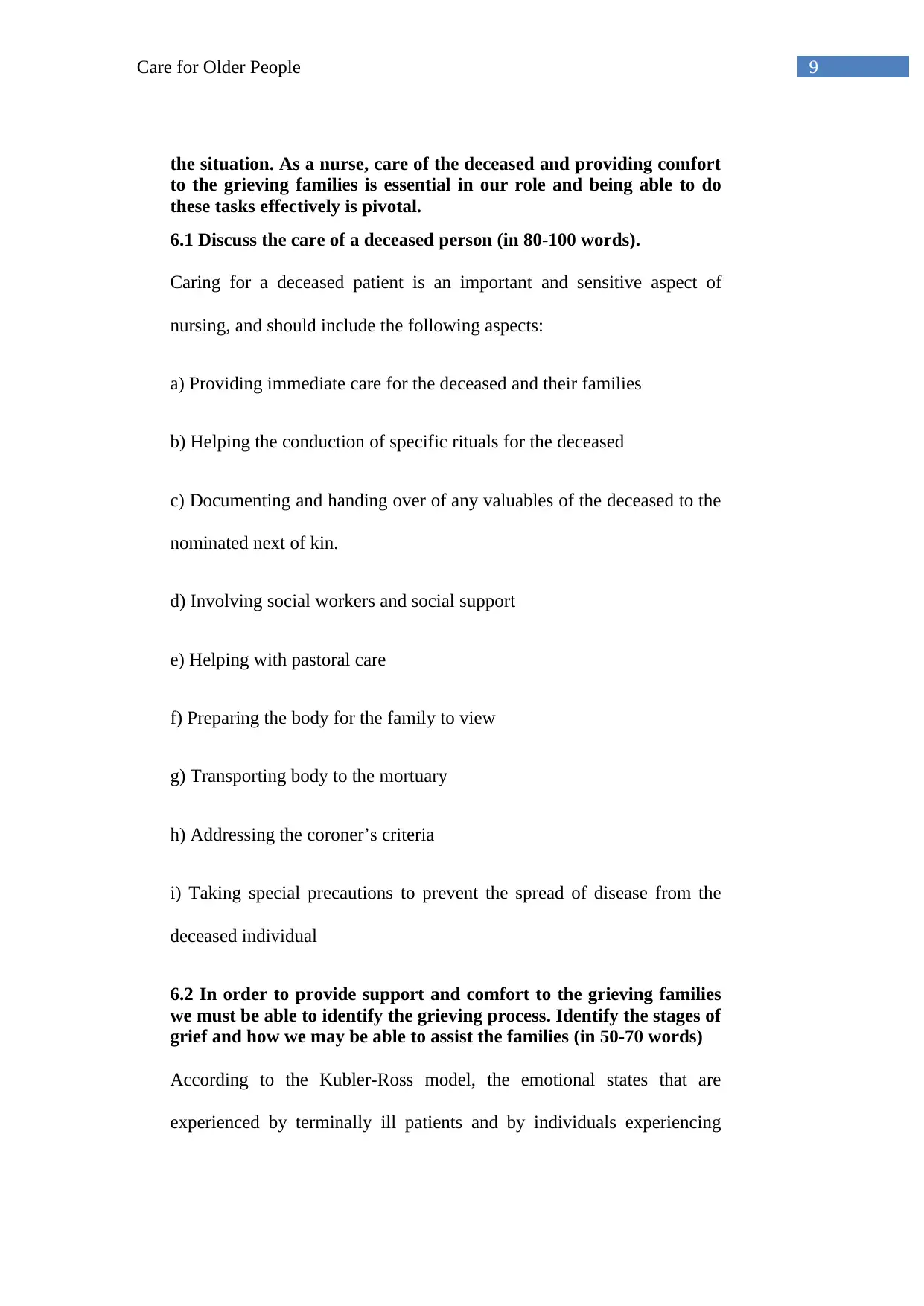
9Care for Older People
the situation. As a nurse, care of the deceased and providing comfort
to the grieving families is essential in our role and being able to do
these tasks effectively is pivotal.
6.1 Discuss the care of a deceased person (in 80-100 words).
Caring for a deceased patient is an important and sensitive aspect of
nursing, and should include the following aspects:
a) Providing immediate care for the deceased and their families
b) Helping the conduction of specific rituals for the deceased
c) Documenting and handing over of any valuables of the deceased to the
nominated next of kin.
d) Involving social workers and social support
e) Helping with pastoral care
f) Preparing the body for the family to view
g) Transporting body to the mortuary
h) Addressing the coroner’s criteria
i) Taking special precautions to prevent the spread of disease from the
deceased individual
6.2 In order to provide support and comfort to the grieving families
we must be able to identify the grieving process. Identify the stages of
grief and how we may be able to assist the families (in 50-70 words)
According to the Kubler-Ross model, the emotional states that are
experienced by terminally ill patients and by individuals experiencing
the situation. As a nurse, care of the deceased and providing comfort
to the grieving families is essential in our role and being able to do
these tasks effectively is pivotal.
6.1 Discuss the care of a deceased person (in 80-100 words).
Caring for a deceased patient is an important and sensitive aspect of
nursing, and should include the following aspects:
a) Providing immediate care for the deceased and their families
b) Helping the conduction of specific rituals for the deceased
c) Documenting and handing over of any valuables of the deceased to the
nominated next of kin.
d) Involving social workers and social support
e) Helping with pastoral care
f) Preparing the body for the family to view
g) Transporting body to the mortuary
h) Addressing the coroner’s criteria
i) Taking special precautions to prevent the spread of disease from the
deceased individual
6.2 In order to provide support and comfort to the grieving families
we must be able to identify the grieving process. Identify the stages of
grief and how we may be able to assist the families (in 50-70 words)
According to the Kubler-Ross model, the emotional states that are
experienced by terminally ill patients and by individuals experiencing
Secure Best Marks with AI Grader
Need help grading? Try our AI Grader for instant feedback on your assignments.
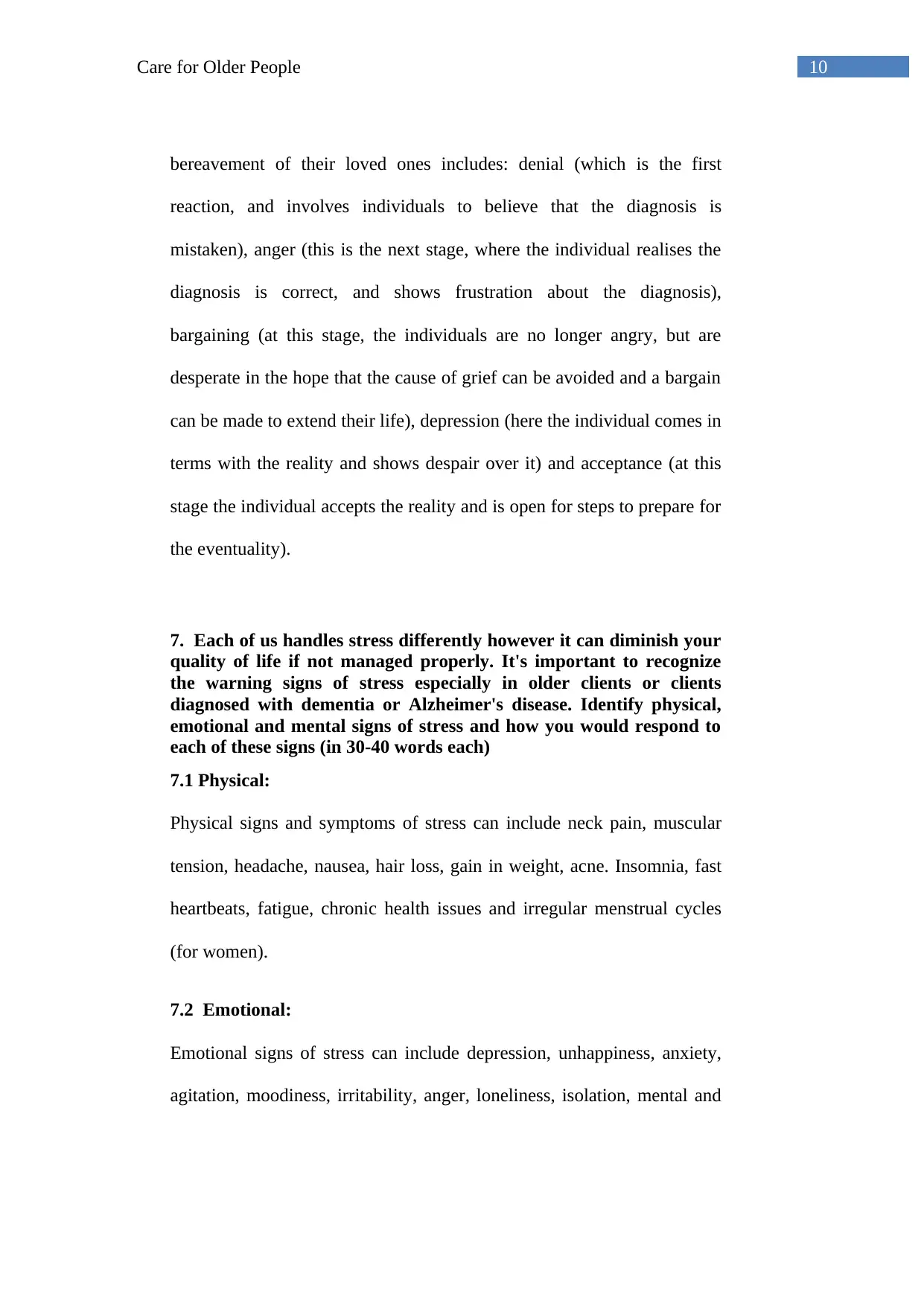
10Care for Older People
bereavement of their loved ones includes: denial (which is the first
reaction, and involves individuals to believe that the diagnosis is
mistaken), anger (this is the next stage, where the individual realises the
diagnosis is correct, and shows frustration about the diagnosis),
bargaining (at this stage, the individuals are no longer angry, but are
desperate in the hope that the cause of grief can be avoided and a bargain
can be made to extend their life), depression (here the individual comes in
terms with the reality and shows despair over it) and acceptance (at this
stage the individual accepts the reality and is open for steps to prepare for
the eventuality).
7. Each of us handles stress differently however it can diminish your
quality of life if not managed properly. It's important to recognize
the warning signs of stress especially in older clients or clients
diagnosed with dementia or Alzheimer's disease. Identify physical,
emotional and mental signs of stress and how you would respond to
each of these signs (in 30-40 words each)
7.1 Physical:
Physical signs and symptoms of stress can include neck pain, muscular
tension, headache, nausea, hair loss, gain in weight, acne. Insomnia, fast
heartbeats, fatigue, chronic health issues and irregular menstrual cycles
(for women).
7.2 Emotional:
Emotional signs of stress can include depression, unhappiness, anxiety,
agitation, moodiness, irritability, anger, loneliness, isolation, mental and
bereavement of their loved ones includes: denial (which is the first
reaction, and involves individuals to believe that the diagnosis is
mistaken), anger (this is the next stage, where the individual realises the
diagnosis is correct, and shows frustration about the diagnosis),
bargaining (at this stage, the individuals are no longer angry, but are
desperate in the hope that the cause of grief can be avoided and a bargain
can be made to extend their life), depression (here the individual comes in
terms with the reality and shows despair over it) and acceptance (at this
stage the individual accepts the reality and is open for steps to prepare for
the eventuality).
7. Each of us handles stress differently however it can diminish your
quality of life if not managed properly. It's important to recognize
the warning signs of stress especially in older clients or clients
diagnosed with dementia or Alzheimer's disease. Identify physical,
emotional and mental signs of stress and how you would respond to
each of these signs (in 30-40 words each)
7.1 Physical:
Physical signs and symptoms of stress can include neck pain, muscular
tension, headache, nausea, hair loss, gain in weight, acne. Insomnia, fast
heartbeats, fatigue, chronic health issues and irregular menstrual cycles
(for women).
7.2 Emotional:
Emotional signs of stress can include depression, unhappiness, anxiety,
agitation, moodiness, irritability, anger, loneliness, isolation, mental and
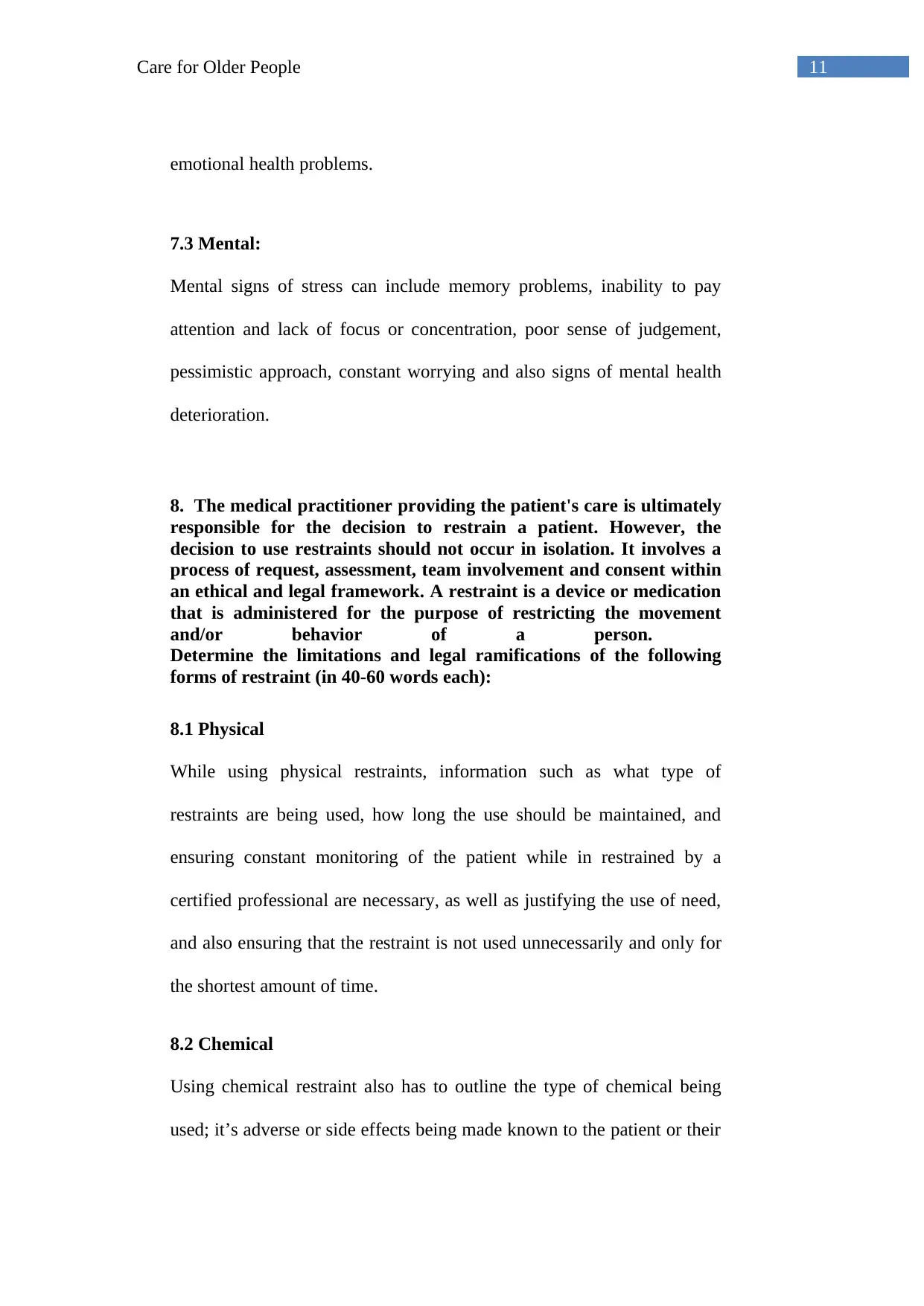
11Care for Older People
emotional health problems.
7.3 Mental:
Mental signs of stress can include memory problems, inability to pay
attention and lack of focus or concentration, poor sense of judgement,
pessimistic approach, constant worrying and also signs of mental health
deterioration.
8. The medical practitioner providing the patient's care is ultimately
responsible for the decision to restrain a patient. However, the
decision to use restraints should not occur in isolation. It involves a
process of request, assessment, team involvement and consent within
an ethical and legal framework. A restraint is a device or medication
that is administered for the purpose of restricting the movement
and/or behavior of a person.
Determine the limitations and legal ramifications of the following
forms of restraint (in 40-60 words each):
8.1 Physical
While using physical restraints, information such as what type of
restraints are being used, how long the use should be maintained, and
ensuring constant monitoring of the patient while in restrained by a
certified professional are necessary, as well as justifying the use of need,
and also ensuring that the restraint is not used unnecessarily and only for
the shortest amount of time.
8.2 Chemical
Using chemical restraint also has to outline the type of chemical being
used; it’s adverse or side effects being made known to the patient or their
emotional health problems.
7.3 Mental:
Mental signs of stress can include memory problems, inability to pay
attention and lack of focus or concentration, poor sense of judgement,
pessimistic approach, constant worrying and also signs of mental health
deterioration.
8. The medical practitioner providing the patient's care is ultimately
responsible for the decision to restrain a patient. However, the
decision to use restraints should not occur in isolation. It involves a
process of request, assessment, team involvement and consent within
an ethical and legal framework. A restraint is a device or medication
that is administered for the purpose of restricting the movement
and/or behavior of a person.
Determine the limitations and legal ramifications of the following
forms of restraint (in 40-60 words each):
8.1 Physical
While using physical restraints, information such as what type of
restraints are being used, how long the use should be maintained, and
ensuring constant monitoring of the patient while in restrained by a
certified professional are necessary, as well as justifying the use of need,
and also ensuring that the restraint is not used unnecessarily and only for
the shortest amount of time.
8.2 Chemical
Using chemical restraint also has to outline the type of chemical being
used; it’s adverse or side effects being made known to the patient or their
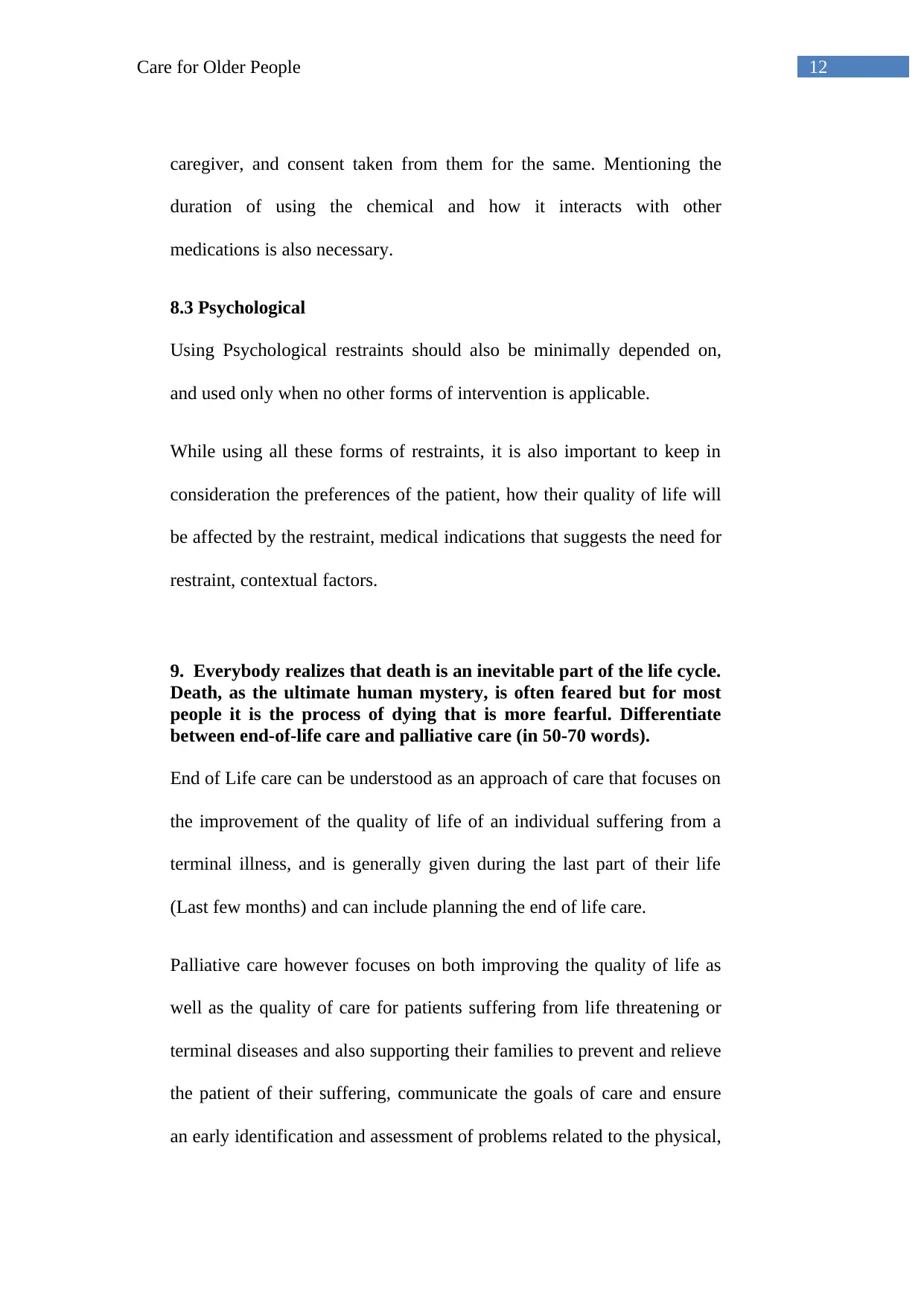
12Care for Older People
caregiver, and consent taken from them for the same. Mentioning the
duration of using the chemical and how it interacts with other
medications is also necessary.
8.3 Psychological
Using Psychological restraints should also be minimally depended on,
and used only when no other forms of intervention is applicable.
While using all these forms of restraints, it is also important to keep in
consideration the preferences of the patient, how their quality of life will
be affected by the restraint, medical indications that suggests the need for
restraint, contextual factors.
9. Everybody realizes that death is an inevitable part of the life cycle.
Death, as the ultimate human mystery, is often feared but for most
people it is the process of dying that is more fearful. Differentiate
between end-of-life care and palliative care (in 50-70 words).
End of Life care can be understood as an approach of care that focuses on
the improvement of the quality of life of an individual suffering from a
terminal illness, and is generally given during the last part of their life
(Last few months) and can include planning the end of life care.
Palliative care however focuses on both improving the quality of life as
well as the quality of care for patients suffering from life threatening or
terminal diseases and also supporting their families to prevent and relieve
the patient of their suffering, communicate the goals of care and ensure
an early identification and assessment of problems related to the physical,
caregiver, and consent taken from them for the same. Mentioning the
duration of using the chemical and how it interacts with other
medications is also necessary.
8.3 Psychological
Using Psychological restraints should also be minimally depended on,
and used only when no other forms of intervention is applicable.
While using all these forms of restraints, it is also important to keep in
consideration the preferences of the patient, how their quality of life will
be affected by the restraint, medical indications that suggests the need for
restraint, contextual factors.
9. Everybody realizes that death is an inevitable part of the life cycle.
Death, as the ultimate human mystery, is often feared but for most
people it is the process of dying that is more fearful. Differentiate
between end-of-life care and palliative care (in 50-70 words).
End of Life care can be understood as an approach of care that focuses on
the improvement of the quality of life of an individual suffering from a
terminal illness, and is generally given during the last part of their life
(Last few months) and can include planning the end of life care.
Palliative care however focuses on both improving the quality of life as
well as the quality of care for patients suffering from life threatening or
terminal diseases and also supporting their families to prevent and relieve
the patient of their suffering, communicate the goals of care and ensure
an early identification and assessment of problems related to the physical,
Paraphrase This Document
Need a fresh take? Get an instant paraphrase of this document with our AI Paraphraser
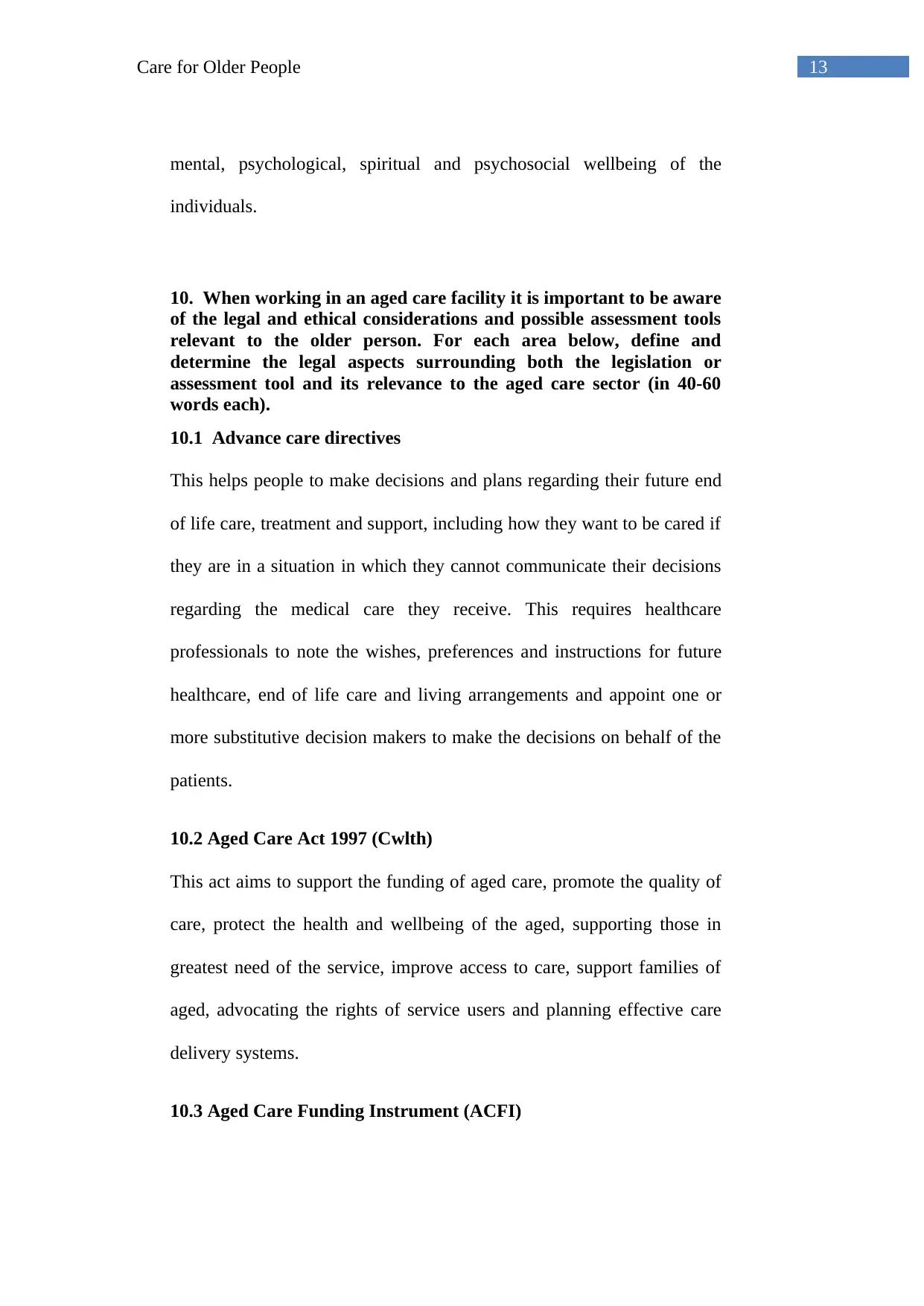
13Care for Older People
mental, psychological, spiritual and psychosocial wellbeing of the
individuals.
10. When working in an aged care facility it is important to be aware
of the legal and ethical considerations and possible assessment tools
relevant to the older person. For each area below, define and
determine the legal aspects surrounding both the legislation or
assessment tool and its relevance to the aged care sector (in 40-60
words each).
10.1 Advance care directives
This helps people to make decisions and plans regarding their future end
of life care, treatment and support, including how they want to be cared if
they are in a situation in which they cannot communicate their decisions
regarding the medical care they receive. This requires healthcare
professionals to note the wishes, preferences and instructions for future
healthcare, end of life care and living arrangements and appoint one or
more substitutive decision makers to make the decisions on behalf of the
patients.
10.2 Aged Care Act 1997 (Cwlth)
This act aims to support the funding of aged care, promote the quality of
care, protect the health and wellbeing of the aged, supporting those in
greatest need of the service, improve access to care, support families of
aged, advocating the rights of service users and planning effective care
delivery systems.
10.3 Aged Care Funding Instrument (ACFI)
mental, psychological, spiritual and psychosocial wellbeing of the
individuals.
10. When working in an aged care facility it is important to be aware
of the legal and ethical considerations and possible assessment tools
relevant to the older person. For each area below, define and
determine the legal aspects surrounding both the legislation or
assessment tool and its relevance to the aged care sector (in 40-60
words each).
10.1 Advance care directives
This helps people to make decisions and plans regarding their future end
of life care, treatment and support, including how they want to be cared if
they are in a situation in which they cannot communicate their decisions
regarding the medical care they receive. This requires healthcare
professionals to note the wishes, preferences and instructions for future
healthcare, end of life care and living arrangements and appoint one or
more substitutive decision makers to make the decisions on behalf of the
patients.
10.2 Aged Care Act 1997 (Cwlth)
This act aims to support the funding of aged care, promote the quality of
care, protect the health and wellbeing of the aged, supporting those in
greatest need of the service, improve access to care, support families of
aged, advocating the rights of service users and planning effective care
delivery systems.
10.3 Aged Care Funding Instrument (ACFI)
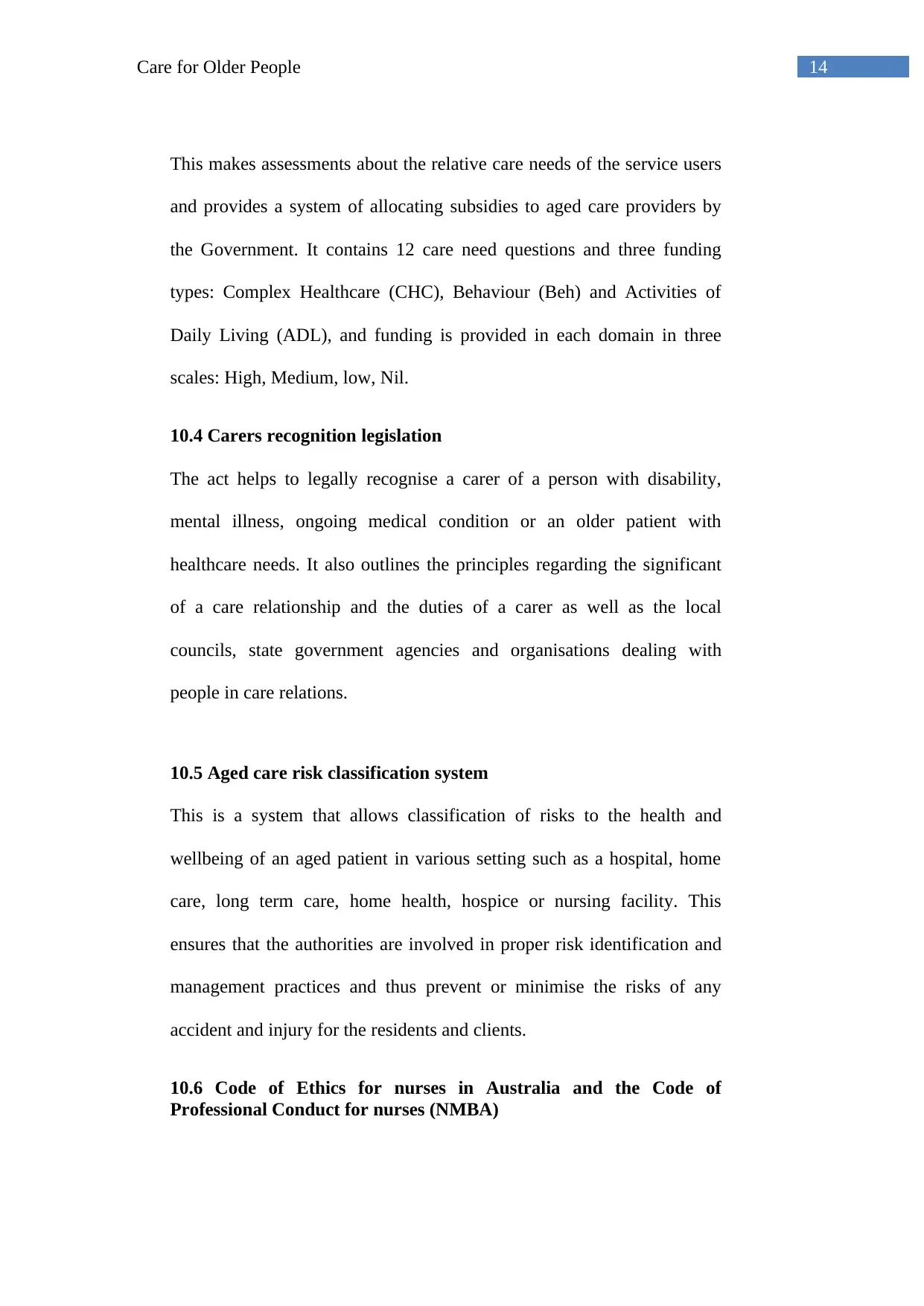
14Care for Older People
This makes assessments about the relative care needs of the service users
and provides a system of allocating subsidies to aged care providers by
the Government. It contains 12 care need questions and three funding
types: Complex Healthcare (CHC), Behaviour (Beh) and Activities of
Daily Living (ADL), and funding is provided in each domain in three
scales: High, Medium, low, Nil.
10.4 Carers recognition legislation
The act helps to legally recognise a carer of a person with disability,
mental illness, ongoing medical condition or an older patient with
healthcare needs. It also outlines the principles regarding the significant
of a care relationship and the duties of a carer as well as the local
councils, state government agencies and organisations dealing with
people in care relations.
10.5 Aged care risk classification system
This is a system that allows classification of risks to the health and
wellbeing of an aged patient in various setting such as a hospital, home
care, long term care, home health, hospice or nursing facility. This
ensures that the authorities are involved in proper risk identification and
management practices and thus prevent or minimise the risks of any
accident and injury for the residents and clients.
10.6 Code of Ethics for nurses in Australia and the Code of
Professional Conduct for nurses (NMBA)
This makes assessments about the relative care needs of the service users
and provides a system of allocating subsidies to aged care providers by
the Government. It contains 12 care need questions and three funding
types: Complex Healthcare (CHC), Behaviour (Beh) and Activities of
Daily Living (ADL), and funding is provided in each domain in three
scales: High, Medium, low, Nil.
10.4 Carers recognition legislation
The act helps to legally recognise a carer of a person with disability,
mental illness, ongoing medical condition or an older patient with
healthcare needs. It also outlines the principles regarding the significant
of a care relationship and the duties of a carer as well as the local
councils, state government agencies and organisations dealing with
people in care relations.
10.5 Aged care risk classification system
This is a system that allows classification of risks to the health and
wellbeing of an aged patient in various setting such as a hospital, home
care, long term care, home health, hospice or nursing facility. This
ensures that the authorities are involved in proper risk identification and
management practices and thus prevent or minimise the risks of any
accident and injury for the residents and clients.
10.6 Code of Ethics for nurses in Australia and the Code of
Professional Conduct for nurses (NMBA)
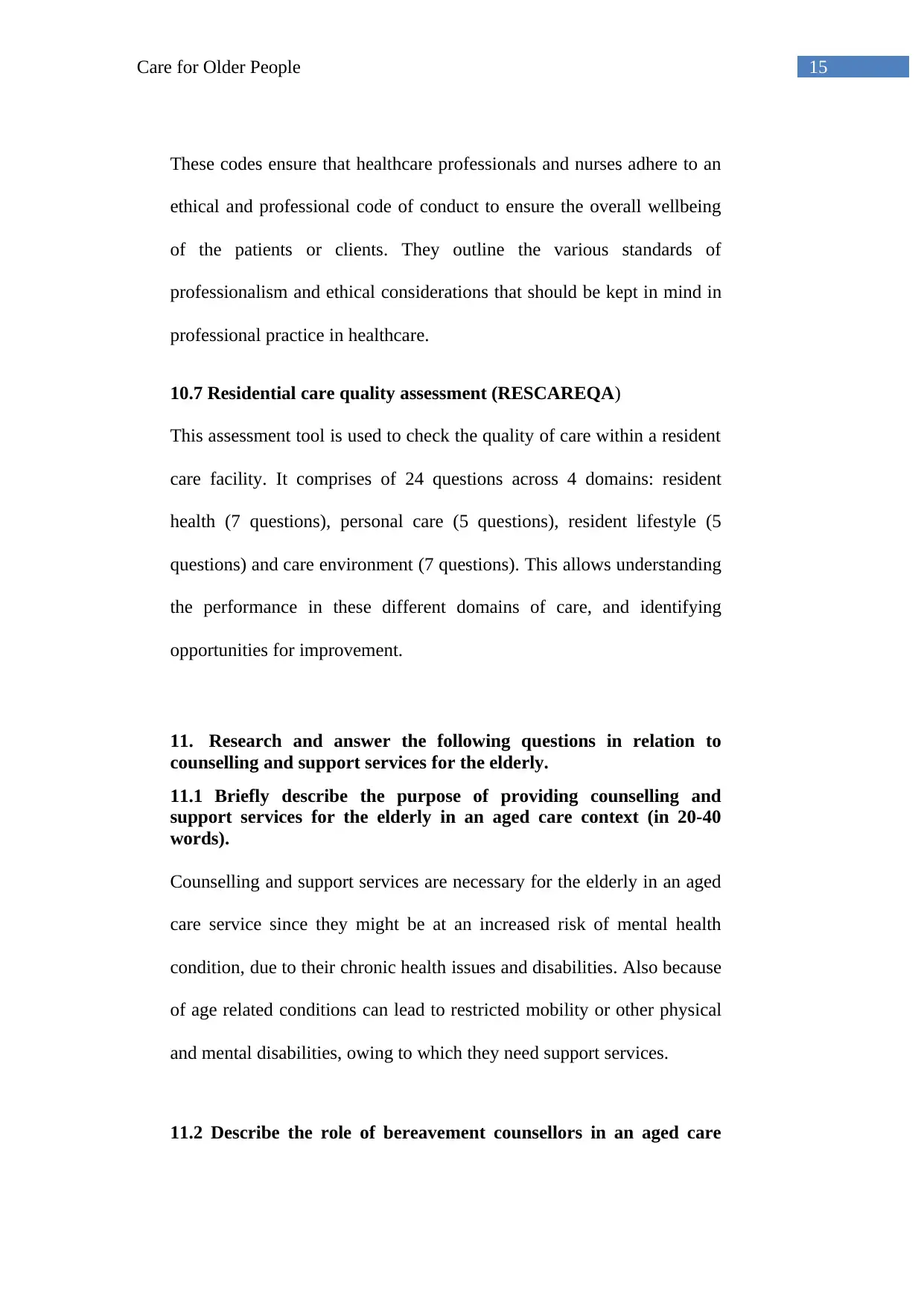
15Care for Older People
These codes ensure that healthcare professionals and nurses adhere to an
ethical and professional code of conduct to ensure the overall wellbeing
of the patients or clients. They outline the various standards of
professionalism and ethical considerations that should be kept in mind in
professional practice in healthcare.
10.7 Residential care quality assessment (RESCAREQA)
This assessment tool is used to check the quality of care within a resident
care facility. It comprises of 24 questions across 4 domains: resident
health (7 questions), personal care (5 questions), resident lifestyle (5
questions) and care environment (7 questions). This allows understanding
the performance in these different domains of care, and identifying
opportunities for improvement.
11. Research and answer the following questions in relation to
counselling and support services for the elderly.
11.1 Briefly describe the purpose of providing counselling and
support services for the elderly in an aged care context (in 20-40
words).
Counselling and support services are necessary for the elderly in an aged
care service since they might be at an increased risk of mental health
condition, due to their chronic health issues and disabilities. Also because
of age related conditions can lead to restricted mobility or other physical
and mental disabilities, owing to which they need support services.
11.2 Describe the role of bereavement counsellors in an aged care
These codes ensure that healthcare professionals and nurses adhere to an
ethical and professional code of conduct to ensure the overall wellbeing
of the patients or clients. They outline the various standards of
professionalism and ethical considerations that should be kept in mind in
professional practice in healthcare.
10.7 Residential care quality assessment (RESCAREQA)
This assessment tool is used to check the quality of care within a resident
care facility. It comprises of 24 questions across 4 domains: resident
health (7 questions), personal care (5 questions), resident lifestyle (5
questions) and care environment (7 questions). This allows understanding
the performance in these different domains of care, and identifying
opportunities for improvement.
11. Research and answer the following questions in relation to
counselling and support services for the elderly.
11.1 Briefly describe the purpose of providing counselling and
support services for the elderly in an aged care context (in 20-40
words).
Counselling and support services are necessary for the elderly in an aged
care service since they might be at an increased risk of mental health
condition, due to their chronic health issues and disabilities. Also because
of age related conditions can lead to restricted mobility or other physical
and mental disabilities, owing to which they need support services.
11.2 Describe the role of bereavement counsellors in an aged care
Secure Best Marks with AI Grader
Need help grading? Try our AI Grader for instant feedback on your assignments.
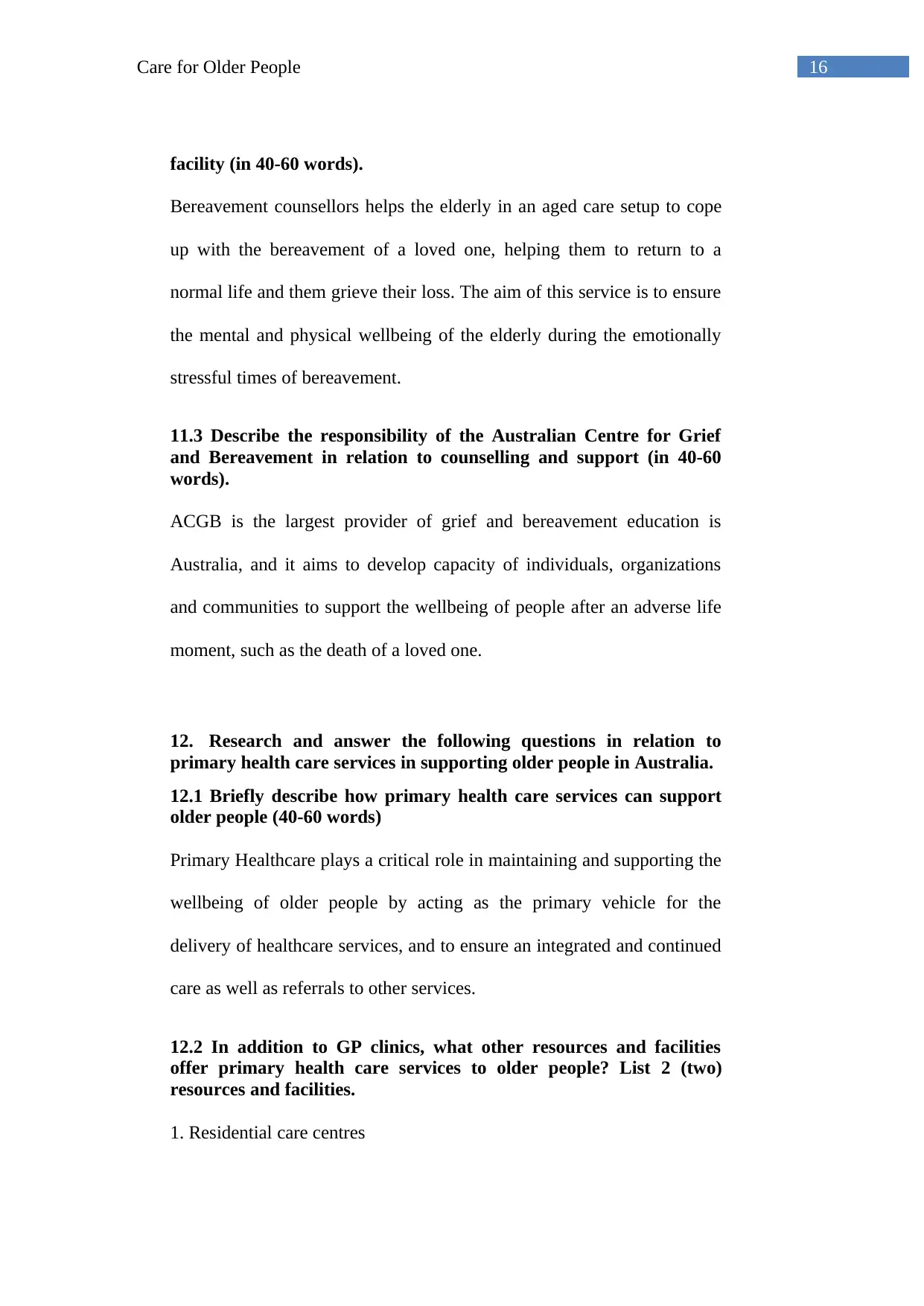
16Care for Older People
facility (in 40-60 words).
Bereavement counsellors helps the elderly in an aged care setup to cope
up with the bereavement of a loved one, helping them to return to a
normal life and them grieve their loss. The aim of this service is to ensure
the mental and physical wellbeing of the elderly during the emotionally
stressful times of bereavement.
11.3 Describe the responsibility of the Australian Centre for Grief
and Bereavement in relation to counselling and support (in 40-60
words).
ACGB is the largest provider of grief and bereavement education is
Australia, and it aims to develop capacity of individuals, organizations
and communities to support the wellbeing of people after an adverse life
moment, such as the death of a loved one.
12. Research and answer the following questions in relation to
primary health care services in supporting older people in Australia.
12.1 Briefly describe how primary health care services can support
older people (40-60 words)
Primary Healthcare plays a critical role in maintaining and supporting the
wellbeing of older people by acting as the primary vehicle for the
delivery of healthcare services, and to ensure an integrated and continued
care as well as referrals to other services.
12.2 In addition to GP clinics, what other resources and facilities
offer primary health care services to older people? List 2 (two)
resources and facilities.
1. Residential care centres
facility (in 40-60 words).
Bereavement counsellors helps the elderly in an aged care setup to cope
up with the bereavement of a loved one, helping them to return to a
normal life and them grieve their loss. The aim of this service is to ensure
the mental and physical wellbeing of the elderly during the emotionally
stressful times of bereavement.
11.3 Describe the responsibility of the Australian Centre for Grief
and Bereavement in relation to counselling and support (in 40-60
words).
ACGB is the largest provider of grief and bereavement education is
Australia, and it aims to develop capacity of individuals, organizations
and communities to support the wellbeing of people after an adverse life
moment, such as the death of a loved one.
12. Research and answer the following questions in relation to
primary health care services in supporting older people in Australia.
12.1 Briefly describe how primary health care services can support
older people (40-60 words)
Primary Healthcare plays a critical role in maintaining and supporting the
wellbeing of older people by acting as the primary vehicle for the
delivery of healthcare services, and to ensure an integrated and continued
care as well as referrals to other services.
12.2 In addition to GP clinics, what other resources and facilities
offer primary health care services to older people? List 2 (two)
resources and facilities.
1. Residential care centres
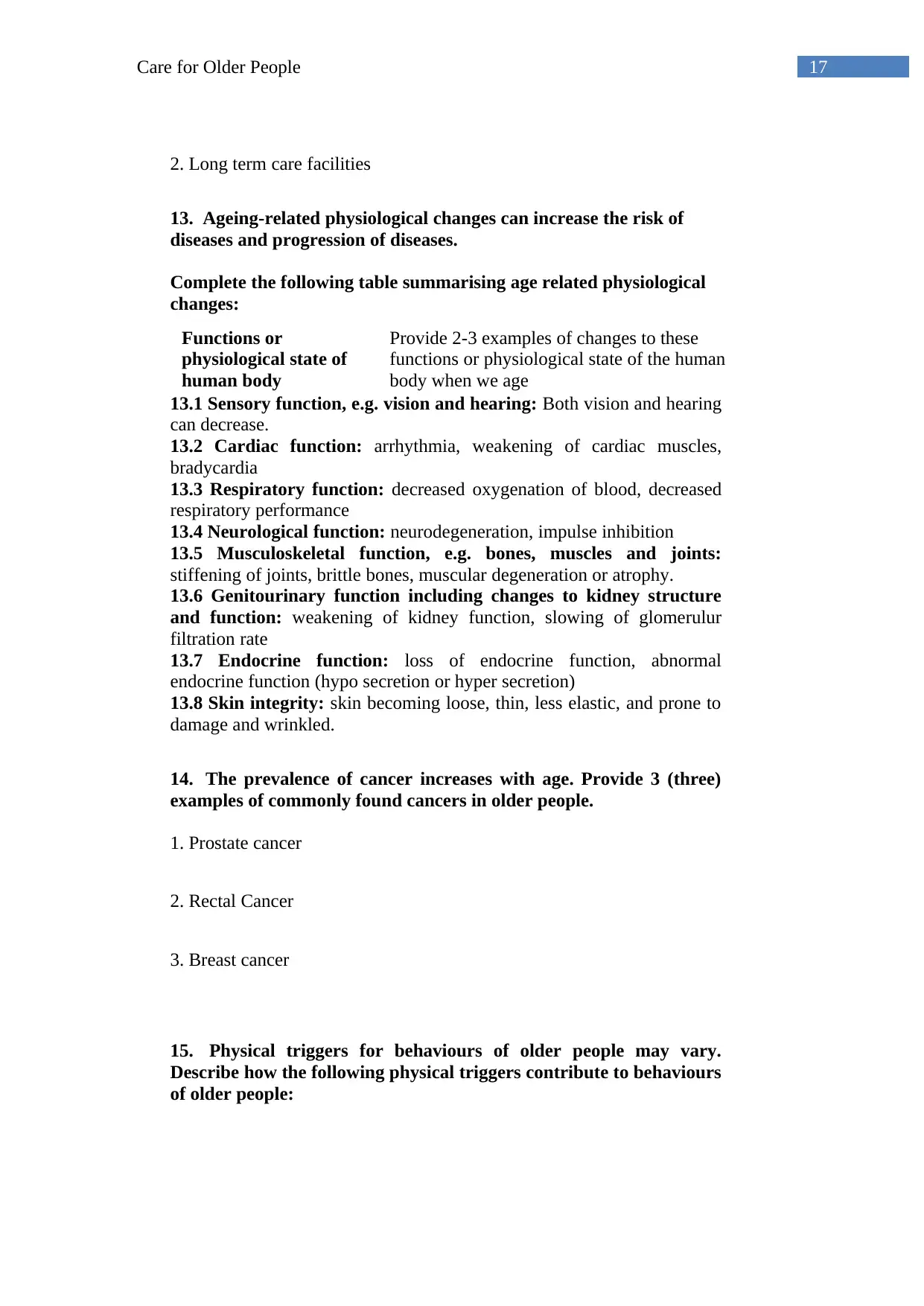
17Care for Older People
2. Long term care facilities
13. Ageing-related physiological changes can increase the risk of
diseases and progression of diseases.
Complete the following table summarising age related physiological
changes:
Functions or
physiological state of
human body
Provide 2-3 examples of changes to these
functions or physiological state of the human
body when we age
13.1 Sensory function, e.g. vision and hearing: Both vision and hearing
can decrease.
13.2 Cardiac function: arrhythmia, weakening of cardiac muscles,
bradycardia
13.3 Respiratory function: decreased oxygenation of blood, decreased
respiratory performance
13.4 Neurological function: neurodegeneration, impulse inhibition
13.5 Musculoskeletal function, e.g. bones, muscles and joints:
stiffening of joints, brittle bones, muscular degeneration or atrophy.
13.6 Genitourinary function including changes to kidney structure
and function: weakening of kidney function, slowing of glomerulur
filtration rate
13.7 Endocrine function: loss of endocrine function, abnormal
endocrine function (hypo secretion or hyper secretion)
13.8 Skin integrity: skin becoming loose, thin, less elastic, and prone to
damage and wrinkled.
14. The prevalence of cancer increases with age. Provide 3 (three)
examples of commonly found cancers in older people.
1. Prostate cancer
2. Rectal Cancer
3. Breast cancer
15. Physical triggers for behaviours of older people may vary.
Describe how the following physical triggers contribute to behaviours
of older people:
2. Long term care facilities
13. Ageing-related physiological changes can increase the risk of
diseases and progression of diseases.
Complete the following table summarising age related physiological
changes:
Functions or
physiological state of
human body
Provide 2-3 examples of changes to these
functions or physiological state of the human
body when we age
13.1 Sensory function, e.g. vision and hearing: Both vision and hearing
can decrease.
13.2 Cardiac function: arrhythmia, weakening of cardiac muscles,
bradycardia
13.3 Respiratory function: decreased oxygenation of blood, decreased
respiratory performance
13.4 Neurological function: neurodegeneration, impulse inhibition
13.5 Musculoskeletal function, e.g. bones, muscles and joints:
stiffening of joints, brittle bones, muscular degeneration or atrophy.
13.6 Genitourinary function including changes to kidney structure
and function: weakening of kidney function, slowing of glomerulur
filtration rate
13.7 Endocrine function: loss of endocrine function, abnormal
endocrine function (hypo secretion or hyper secretion)
13.8 Skin integrity: skin becoming loose, thin, less elastic, and prone to
damage and wrinkled.
14. The prevalence of cancer increases with age. Provide 3 (three)
examples of commonly found cancers in older people.
1. Prostate cancer
2. Rectal Cancer
3. Breast cancer
15. Physical triggers for behaviours of older people may vary.
Describe how the following physical triggers contribute to behaviours
of older people:
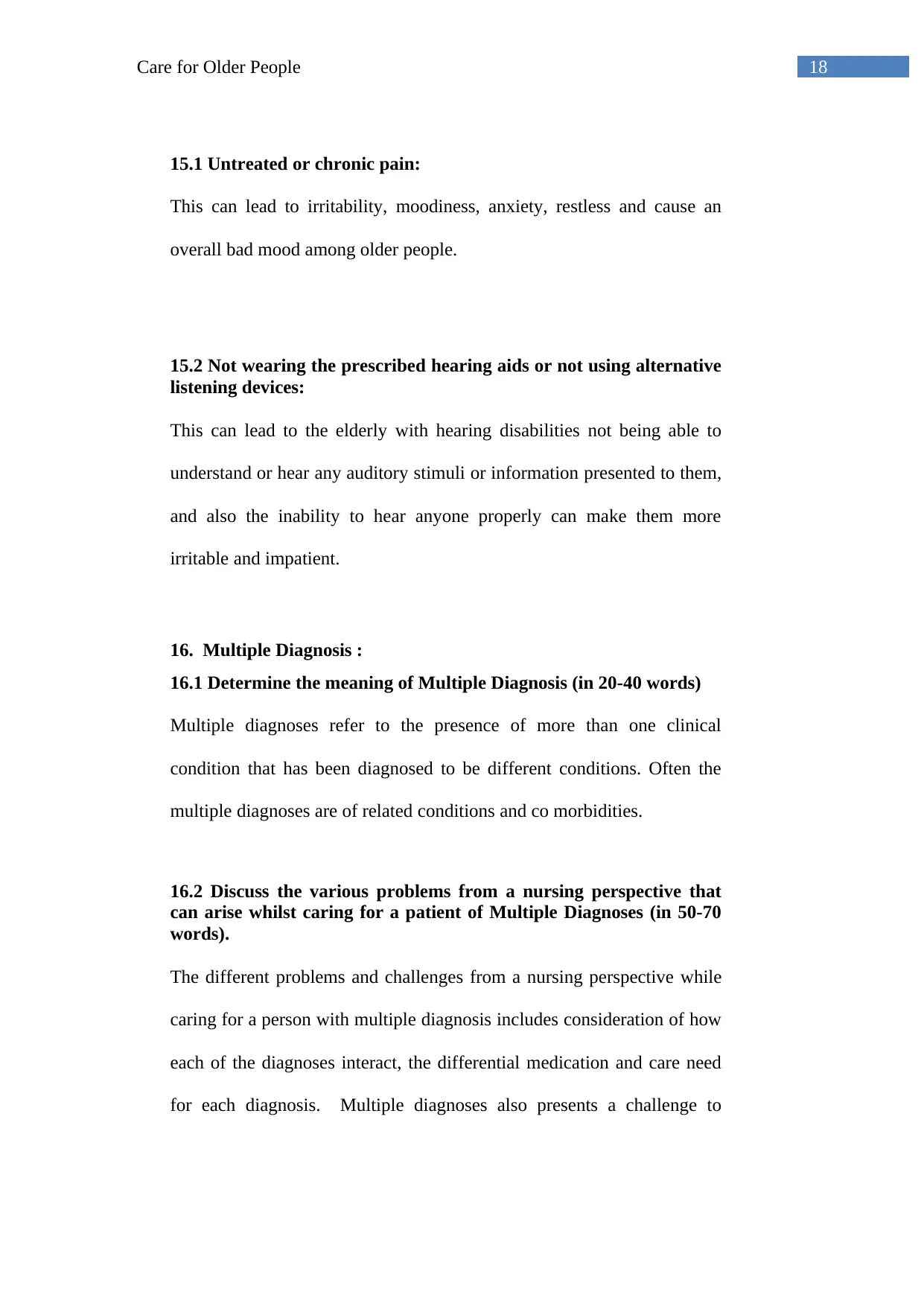
18Care for Older People
15.1 Untreated or chronic pain:
This can lead to irritability, moodiness, anxiety, restless and cause an
overall bad mood among older people.
15.2 Not wearing the prescribed hearing aids or not using alternative
listening devices:
This can lead to the elderly with hearing disabilities not being able to
understand or hear any auditory stimuli or information presented to them,
and also the inability to hear anyone properly can make them more
irritable and impatient.
16. Multiple Diagnosis :
16.1 Determine the meaning of Multiple Diagnosis (in 20-40 words)
Multiple diagnoses refer to the presence of more than one clinical
condition that has been diagnosed to be different conditions. Often the
multiple diagnoses are of related conditions and co morbidities.
16.2 Discuss the various problems from a nursing perspective that
can arise whilst caring for a patient of Multiple Diagnoses (in 50-70
words).
The different problems and challenges from a nursing perspective while
caring for a person with multiple diagnosis includes consideration of how
each of the diagnoses interact, the differential medication and care need
for each diagnosis. Multiple diagnoses also presents a challenge to
15.1 Untreated or chronic pain:
This can lead to irritability, moodiness, anxiety, restless and cause an
overall bad mood among older people.
15.2 Not wearing the prescribed hearing aids or not using alternative
listening devices:
This can lead to the elderly with hearing disabilities not being able to
understand or hear any auditory stimuli or information presented to them,
and also the inability to hear anyone properly can make them more
irritable and impatient.
16. Multiple Diagnosis :
16.1 Determine the meaning of Multiple Diagnosis (in 20-40 words)
Multiple diagnoses refer to the presence of more than one clinical
condition that has been diagnosed to be different conditions. Often the
multiple diagnoses are of related conditions and co morbidities.
16.2 Discuss the various problems from a nursing perspective that
can arise whilst caring for a patient of Multiple Diagnoses (in 50-70
words).
The different problems and challenges from a nursing perspective while
caring for a person with multiple diagnosis includes consideration of how
each of the diagnoses interact, the differential medication and care need
for each diagnosis. Multiple diagnoses also presents a challenge to
Paraphrase This Document
Need a fresh take? Get an instant paraphrase of this document with our AI Paraphraser
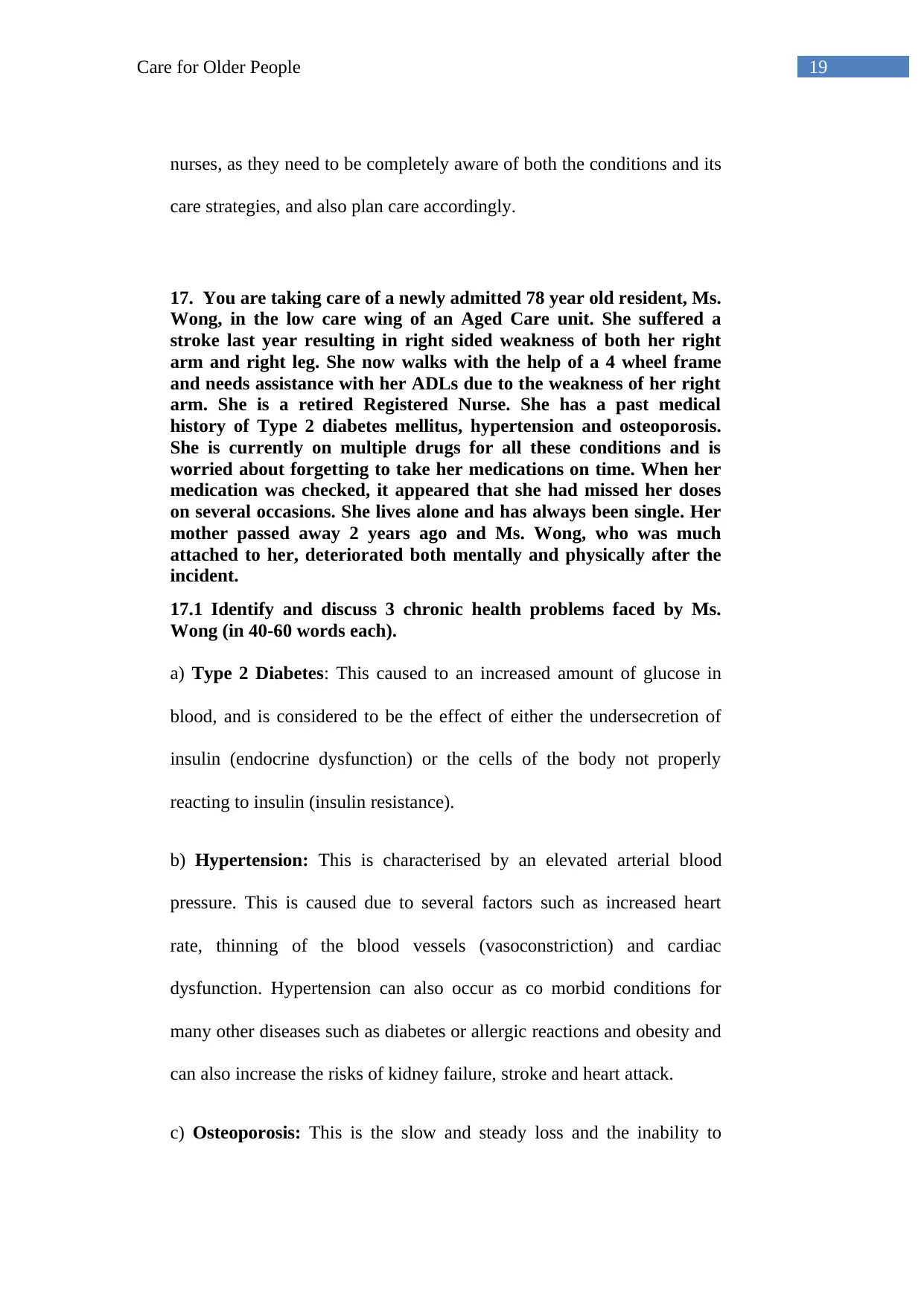
19Care for Older People
nurses, as they need to be completely aware of both the conditions and its
care strategies, and also plan care accordingly.
17. You are taking care of a newly admitted 78 year old resident, Ms.
Wong, in the low care wing of an Aged Care unit. She suffered a
stroke last year resulting in right sided weakness of both her right
arm and right leg. She now walks with the help of a 4 wheel frame
and needs assistance with her ADLs due to the weakness of her right
arm. She is a retired Registered Nurse. She has a past medical
history of Type 2 diabetes mellitus, hypertension and osteoporosis.
She is currently on multiple drugs for all these conditions and is
worried about forgetting to take her medications on time. When her
medication was checked, it appeared that she had missed her doses
on several occasions. She lives alone and has always been single. Her
mother passed away 2 years ago and Ms. Wong, who was much
attached to her, deteriorated both mentally and physically after the
incident.
17.1 Identify and discuss 3 chronic health problems faced by Ms.
Wong (in 40-60 words each).
a) Type 2 Diabetes: This caused to an increased amount of glucose in
blood, and is considered to be the effect of either the undersecretion of
insulin (endocrine dysfunction) or the cells of the body not properly
reacting to insulin (insulin resistance).
b) Hypertension: This is characterised by an elevated arterial blood
pressure. This is caused due to several factors such as increased heart
rate, thinning of the blood vessels (vasoconstriction) and cardiac
dysfunction. Hypertension can also occur as co morbid conditions for
many other diseases such as diabetes or allergic reactions and obesity and
can also increase the risks of kidney failure, stroke and heart attack.
c) Osteoporosis: This is the slow and steady loss and the inability to
nurses, as they need to be completely aware of both the conditions and its
care strategies, and also plan care accordingly.
17. You are taking care of a newly admitted 78 year old resident, Ms.
Wong, in the low care wing of an Aged Care unit. She suffered a
stroke last year resulting in right sided weakness of both her right
arm and right leg. She now walks with the help of a 4 wheel frame
and needs assistance with her ADLs due to the weakness of her right
arm. She is a retired Registered Nurse. She has a past medical
history of Type 2 diabetes mellitus, hypertension and osteoporosis.
She is currently on multiple drugs for all these conditions and is
worried about forgetting to take her medications on time. When her
medication was checked, it appeared that she had missed her doses
on several occasions. She lives alone and has always been single. Her
mother passed away 2 years ago and Ms. Wong, who was much
attached to her, deteriorated both mentally and physically after the
incident.
17.1 Identify and discuss 3 chronic health problems faced by Ms.
Wong (in 40-60 words each).
a) Type 2 Diabetes: This caused to an increased amount of glucose in
blood, and is considered to be the effect of either the undersecretion of
insulin (endocrine dysfunction) or the cells of the body not properly
reacting to insulin (insulin resistance).
b) Hypertension: This is characterised by an elevated arterial blood
pressure. This is caused due to several factors such as increased heart
rate, thinning of the blood vessels (vasoconstriction) and cardiac
dysfunction. Hypertension can also occur as co morbid conditions for
many other diseases such as diabetes or allergic reactions and obesity and
can also increase the risks of kidney failure, stroke and heart attack.
c) Osteoporosis: This is the slow and steady loss and the inability to
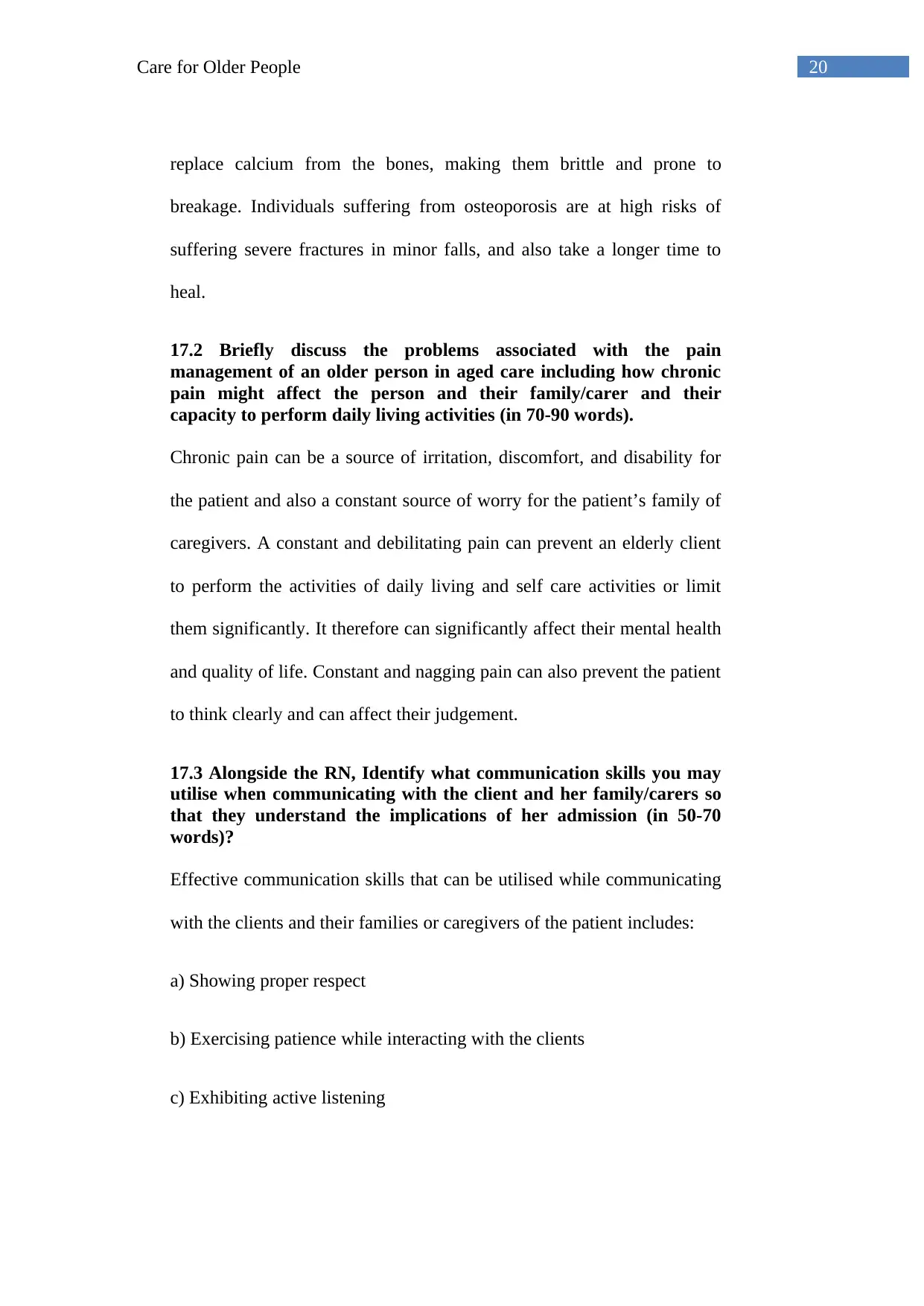
20Care for Older People
replace calcium from the bones, making them brittle and prone to
breakage. Individuals suffering from osteoporosis are at high risks of
suffering severe fractures in minor falls, and also take a longer time to
heal.
17.2 Briefly discuss the problems associated with the pain
management of an older person in aged care including how chronic
pain might affect the person and their family/carer and their
capacity to perform daily living activities (in 70-90 words).
Chronic pain can be a source of irritation, discomfort, and disability for
the patient and also a constant source of worry for the patient’s family of
caregivers. A constant and debilitating pain can prevent an elderly client
to perform the activities of daily living and self care activities or limit
them significantly. It therefore can significantly affect their mental health
and quality of life. Constant and nagging pain can also prevent the patient
to think clearly and can affect their judgement.
17.3 Alongside the RN, Identify what communication skills you may
utilise when communicating with the client and her family/carers so
that they understand the implications of her admission (in 50-70
words)?
Effective communication skills that can be utilised while communicating
with the clients and their families or caregivers of the patient includes:
a) Showing proper respect
b) Exercising patience while interacting with the clients
c) Exhibiting active listening
replace calcium from the bones, making them brittle and prone to
breakage. Individuals suffering from osteoporosis are at high risks of
suffering severe fractures in minor falls, and also take a longer time to
heal.
17.2 Briefly discuss the problems associated with the pain
management of an older person in aged care including how chronic
pain might affect the person and their family/carer and their
capacity to perform daily living activities (in 70-90 words).
Chronic pain can be a source of irritation, discomfort, and disability for
the patient and also a constant source of worry for the patient’s family of
caregivers. A constant and debilitating pain can prevent an elderly client
to perform the activities of daily living and self care activities or limit
them significantly. It therefore can significantly affect their mental health
and quality of life. Constant and nagging pain can also prevent the patient
to think clearly and can affect their judgement.
17.3 Alongside the RN, Identify what communication skills you may
utilise when communicating with the client and her family/carers so
that they understand the implications of her admission (in 50-70
words)?
Effective communication skills that can be utilised while communicating
with the clients and their families or caregivers of the patient includes:
a) Showing proper respect
b) Exercising patience while interacting with the clients
c) Exhibiting active listening
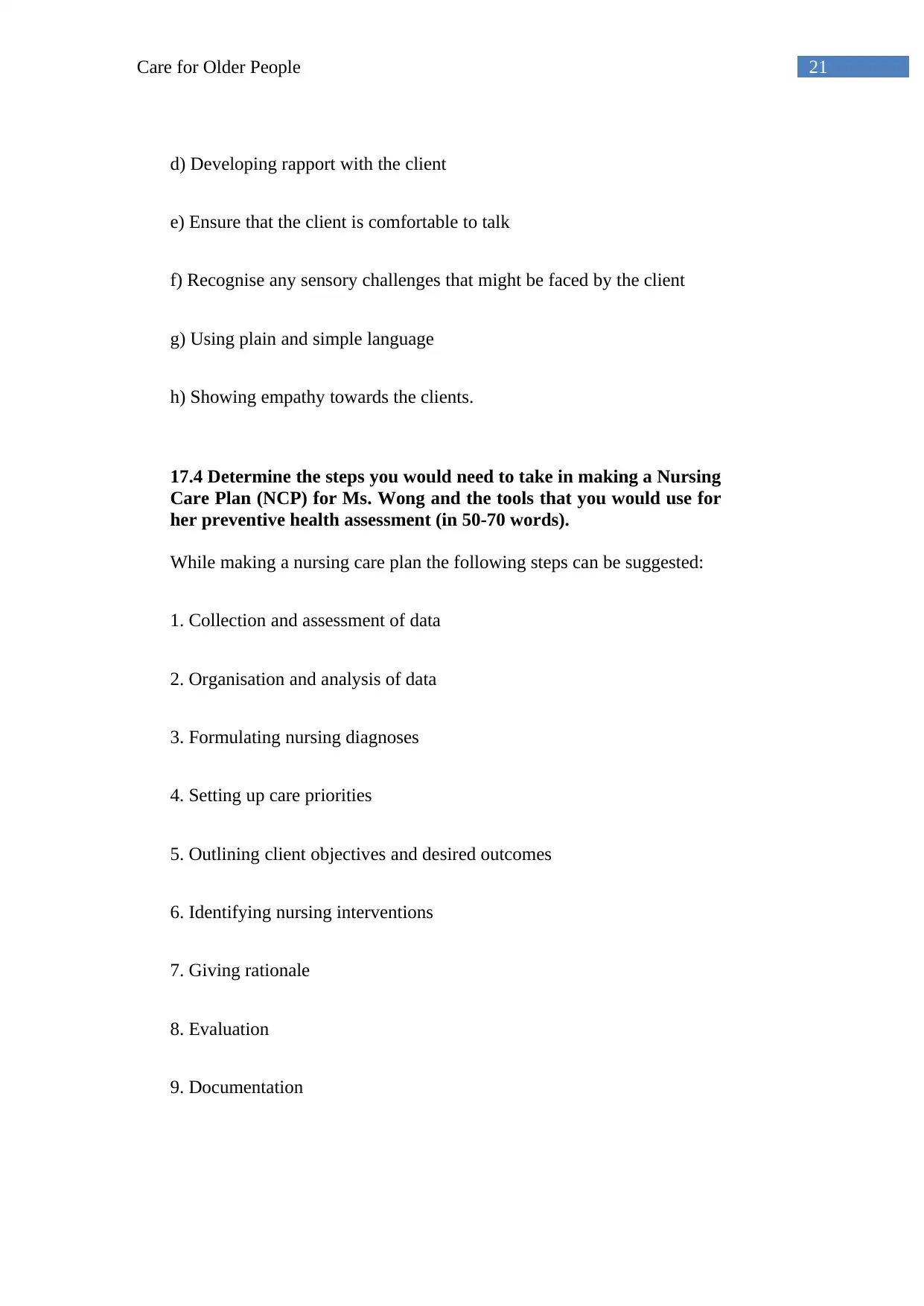
21Care for Older People
d) Developing rapport with the client
e) Ensure that the client is comfortable to talk
f) Recognise any sensory challenges that might be faced by the client
g) Using plain and simple language
h) Showing empathy towards the clients.
17.4 Determine the steps you would need to take in making a Nursing
Care Plan (NCP) for Ms. Wong and the tools that you would use for
her preventive health assessment (in 50-70 words).
While making a nursing care plan the following steps can be suggested:
1. Collection and assessment of data
2. Organisation and analysis of data
3. Formulating nursing diagnoses
4. Setting up care priorities
5. Outlining client objectives and desired outcomes
6. Identifying nursing interventions
7. Giving rationale
8. Evaluation
9. Documentation
d) Developing rapport with the client
e) Ensure that the client is comfortable to talk
f) Recognise any sensory challenges that might be faced by the client
g) Using plain and simple language
h) Showing empathy towards the clients.
17.4 Determine the steps you would need to take in making a Nursing
Care Plan (NCP) for Ms. Wong and the tools that you would use for
her preventive health assessment (in 50-70 words).
While making a nursing care plan the following steps can be suggested:
1. Collection and assessment of data
2. Organisation and analysis of data
3. Formulating nursing diagnoses
4. Setting up care priorities
5. Outlining client objectives and desired outcomes
6. Identifying nursing interventions
7. Giving rationale
8. Evaluation
9. Documentation
Secure Best Marks with AI Grader
Need help grading? Try our AI Grader for instant feedback on your assignments.
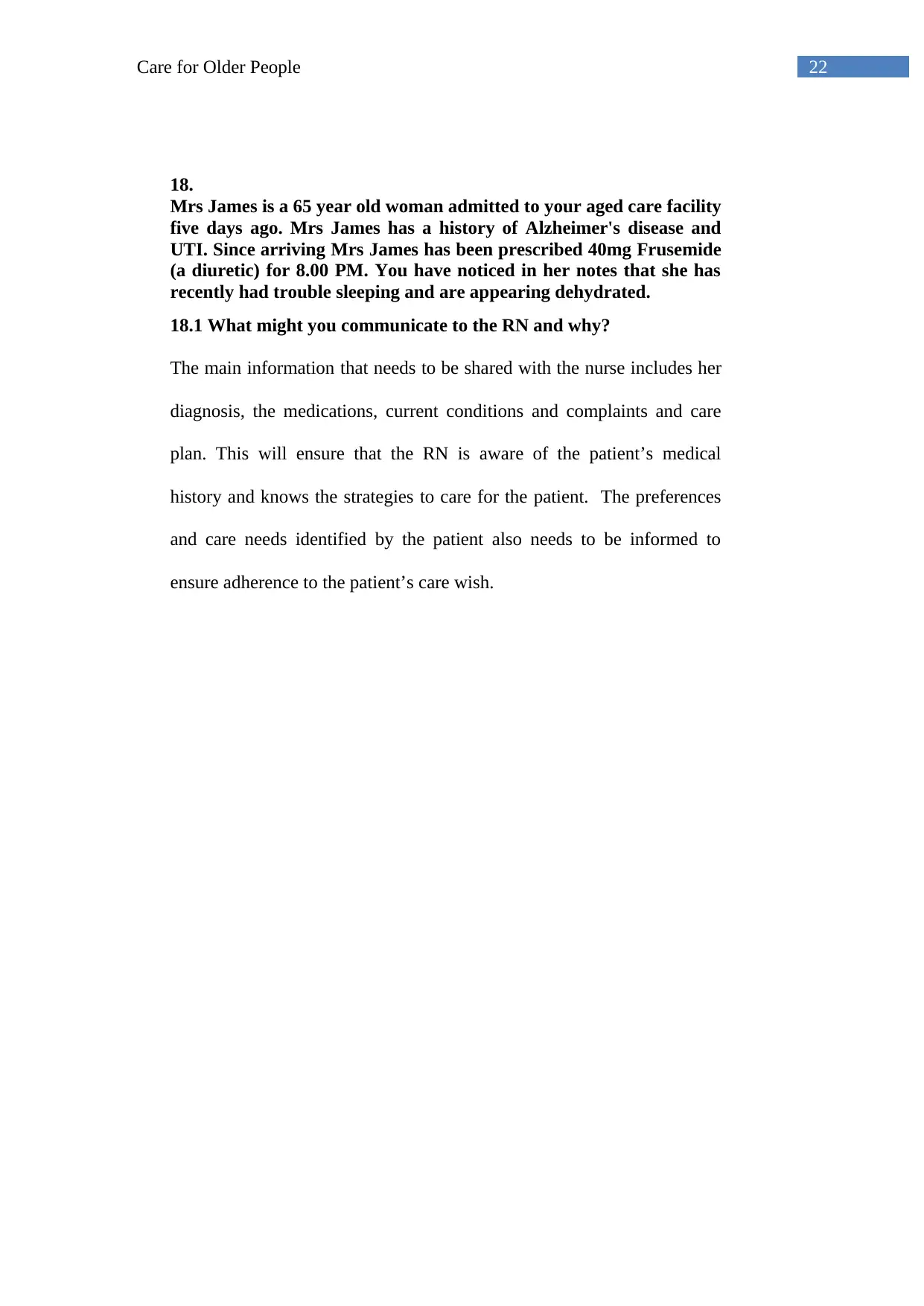
22Care for Older People
18.
Mrs James is a 65 year old woman admitted to your aged care facility
five days ago. Mrs James has a history of Alzheimer's disease and
UTI. Since arriving Mrs James has been prescribed 40mg Frusemide
(a diuretic) for 8.00 PM. You have noticed in her notes that she has
recently had trouble sleeping and are appearing dehydrated.
18.1 What might you communicate to the RN and why?
The main information that needs to be shared with the nurse includes her
diagnosis, the medications, current conditions and complaints and care
plan. This will ensure that the RN is aware of the patient’s medical
history and knows the strategies to care for the patient. The preferences
and care needs identified by the patient also needs to be informed to
ensure adherence to the patient’s care wish.
18.
Mrs James is a 65 year old woman admitted to your aged care facility
five days ago. Mrs James has a history of Alzheimer's disease and
UTI. Since arriving Mrs James has been prescribed 40mg Frusemide
(a diuretic) for 8.00 PM. You have noticed in her notes that she has
recently had trouble sleeping and are appearing dehydrated.
18.1 What might you communicate to the RN and why?
The main information that needs to be shared with the nurse includes her
diagnosis, the medications, current conditions and complaints and care
plan. This will ensure that the RN is aware of the patient’s medical
history and knows the strategies to care for the patient. The preferences
and care needs identified by the patient also needs to be informed to
ensure adherence to the patient’s care wish.
1 out of 23
Related Documents
Your All-in-One AI-Powered Toolkit for Academic Success.
+13062052269
info@desklib.com
Available 24*7 on WhatsApp / Email
![[object Object]](/_next/static/media/star-bottom.7253800d.svg)
Unlock your academic potential
© 2024 | Zucol Services PVT LTD | All rights reserved.





